Changing times in Dora
Most mornings, Olinda Rampersaud captains the boat that takes the Children of Dora to school. Dora is a part of a few communities along the Demerara River. (Samuel
Sunday, June 23, 2024

 Maughn photo)
Maughn photo)

Most mornings, Olinda Rampersaud captains the boat that takes the Children of Dora to school. Dora is a part of a few communities along the Demerara River. (Samuel
Sunday, June 23, 2024

 Maughn photo)
Maughn photo)
MELLECIA Suzana DaSilva recently celebrated 10 more years of life after her near-death experience. During that life-changing moment, someone shot her during a robbery as she was driving. She still doesn’t know who. Being left with spinal cord injuries that confined her to a wheelchair, she never thought the day would come when she would be able to drive a car again, or return to any form of normalcy.
But she did. Today, she is very proud of the progress she has made, and the hard work that she has put in. Also, no words can describe her gratitude to her caring and supportive family members who’ve been there from Day One.
“Looking back at all those years, I would’ve never in my wildest dreams thought that I could even reach this far in this journey,” Suzana told Pepperpot Magazine.
When she sustained the injury, she didn’t even know what spinal cord injury was. When she asked the doctor the dreaded question if she’ll ever be able to walk again, the answer was that it was between her and God. “At that point, I understood what he meant, and I broke down, and I felt like it was the end of the world. It was something I couldn’t process in my mind;I had to figure out how I was going to live my life being in a wheelchair. For the next month, all I could think about was dying.”
Suzana couldn’t see the possibility of living according to her new reality, and never thought she could ever be normal again and live purposefully. “But here I am, and maybe it’s really God and myself; just not in the direction I wanted and that is enough for me.”
In a journey like Suzana’s, the smallest accomplishment is a big deal. She often asks herself just how she was able to make it through those initial gruelling years. “There is no sugar coating when it comes to spinal cord injury. It wasn’t





THE Victoria Community Development Council (CDC) aims to look out for the interests of each member of the community, never ignoring any concern that residents may bring to it, or taking a partisan stance on the basis of politics or other factors that may affect fair treatment of all.
sistance to residents. Though initially starting with beautification works – digging drains and clearing trenches – residents brought up other issues that the council did not want to turn away.

Chairman of the CDC Alex Dane Fraser formed
“We all wanted a place that represented every person’s interest in the community,” Fraser told Pepperpot Magazine. Born and raised in the East Coast Demerara village (even literally), the 33-year-old has been

the legally registered council in April 2021 with other founding members Melanie Norville, Kena Cort, Nikkita Josiah, Omiana Fraser-Kellman, Lennox George, Dwayne Barry, Nickiteha Smith-Bacchus and the late William Frank.
The intention was purely to promote community development and provide as -

thing was to conduct a survey to find out the residents’ issues.
One of the nicest projects that has been completed so far is erecting signs with the correct names of every street in Victoria. “Many residents did not even know the correct names, so we partnered with the private sector and had the correct names listed across Victoria,” Fraser shared.
Other developments came in the agricultural sector. Fraser said that the farmers’ group that existed at the time only benefited a select few, so the CDC worked to change that and make government assistance and opportunities available to farmers across the board.
Victorians are also cognisant of their village’s rich cultural heritage and try to preserve it. In November 1839, 83 ex-slaves from five villages - Douchfour, Ann’s Grove, Hope, Paradise and Enmore - pooled money to buy Plantation Northbrook (now Victoria) for 30,000 guilders.
agency for a faster resolution. Entrepreneurs in the village also receive training and help. There is also an essay competition, kite distribution, and

back-to-school drive, among other initiatives.
“We also donate trophies for persons graduating the primary school. We try to make sure that as long as an activity is being done in the area, we show that support,” Fraser said.
Very soon, the CDC will be starting an after school
programme that it wanted to start since last year and whether school opens or not, the process will be started. So far, Fraser said both the government and the private sector have been assisting the Victoria CDC with its work. “In 2022, due to the Christmas rains, we had a little flooding in the farmland
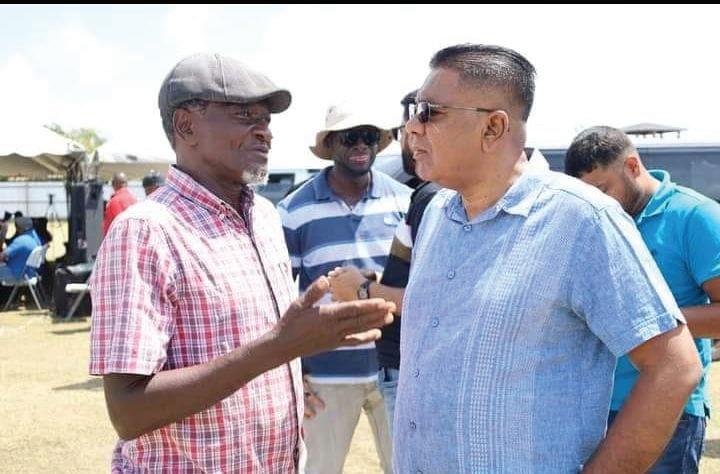
involved in volunteering and community development across the country for over a decade.
Seeing the positive impacts of those efforts, he thought that his community did not have something like this. So he and the other council members held a meeting with residents, and it took off from there. The first
The first church, built in 1845 by William Wilberforce, was called the Wilberforce Congregational Church. The village also has a community centre, nursery and primary schools, which have all seen improvement along the way.
Residents can go to the CDC with any concern related to any sector in government and the body will take it from there and raise the matter with the relevant

and I raised this with ‘Minister Zulfi’, and within two days, we had the excavator come in to assist.”
Fraser explained that the CDC is a non-governmental organisation. “It is not political. If you are coming to the council to raise concerns or access service, we are asking for you not to bring political issues to us; only community development.”
He said every village should have a council like this to represent the residents, and make the community more prosperous and recognised.
WITH determination and a love for cooking, Annie Changa has been satisfying the taste buds and delighting the palette of food lovers locally since she was 22 years old.
Spending endless hours in the kitchen from the comfort of her very own home, Annie’s Frontline Snackette, located at 396 Section ‘C’ Turkeyen, is the place to source a variety of delicious foods.
Changa is a sensation on the social media platform, TikTok, and her insanely mouth-watering foods are prepared fresh from all local ingredients to cater to orders and other occasions.
She is almost 40 years old, and a mother of two who loves cooking. Even spending long hours in the kitchen is what she does, just to get it right for customers.
kitchen, she began preparing egg ball, channa, pholourie, jams, and pickles with the sour to go with it.
Annie Changa
Growing up, Changa used to watch her mother cook daily, and she used to ask many questions. She had a cookbook she wrote down every little detail about the ingredients.
She told the Pepperpot Magazine that over time, she developed a deep love for cooking and after she gained enough experience in the
Changa recalled that she was just 22 years old when she mastered the art of baking and cooking and remembered her first try at making a meal of roti, which was very hard and dry.
Even after that, she became even more determined to develop and sharpen her culinary skills further, and she was confident enough to start a small business in the form of a home-based snackette from her own home.
Today, Changa is well-


versed and can handle herself in the kitchen, but having a newborn posed a challenge for her, and she needed help
and employed a helper.
Eight years ago, she embarked on a cooking/catering journey that has caused her to
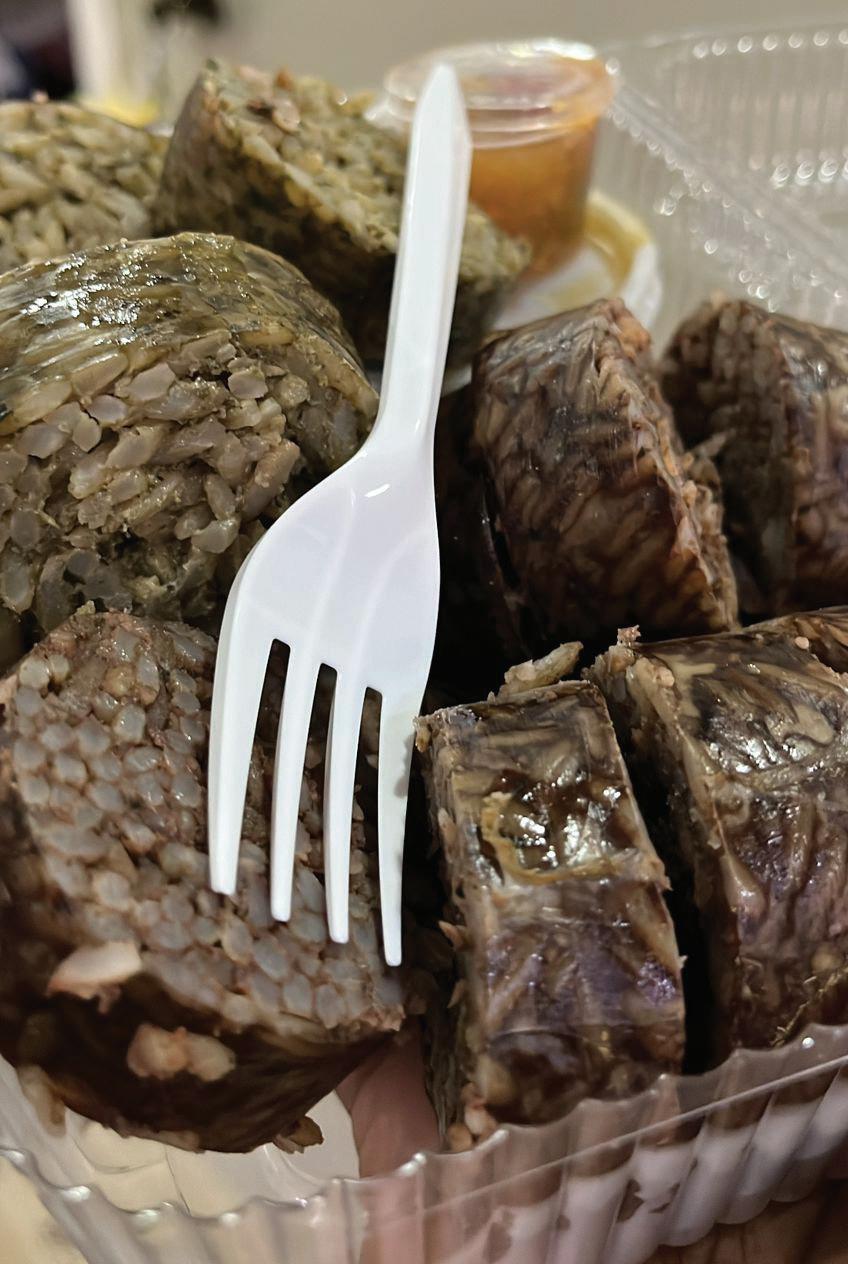
become well-known among her peers, and her small business is developing.

Changa caters for most of the ministries and other places of business and her customers have grown over the years. She aims to have a food court where people can enjoy locally-made foods.
As a full-time cook, she says she enjoys spending time preparing meals from scratch using all local, farmto-market fresh ingredients and would cook based on orders and menu.
Changa is very efficient and manages her time well to ensure that all orders are met precisely and that the delivery service is punctual for lunches and other occasions.
She told the Pepperpot Magazine that she has had not-so-good experiences eating out and buying foods from vendors and she wanted people to have authentic home-style foods as if it was from their own kitchen.
Eating foods that weren’t from her own kitchen did not usually end well for Changa since she would get ill after consuming foods bought from various food entities, and she wanted to change that and give people deliciously prepared foods.
She added that she was inspired and motivated her mother, who is by the way and excellent cook and she learned from her.
Changa stated that her white pudding, baked custard, and mutton curry are among her customers’ favourites and that they would sell out in no time.
“My 20-year-old daughter would assist me at times, and she is versed in Mexican foods, wraps and burgers and has her own version of those foods, so maybe she will follow in my footsteps in having a cooking business,” she said.
Changa told the Pepperpot Magazine that she doesn’t find it hard in the kitchen because she loves cooking and thinks preparing meals from scratch for people who cannot get enough is quite delightful. She is humbled by the outpouring of support from customers, which keeps her small food business afloat and viable.
“I love cooking and I do not see it as time-consuming food preparation and spending hours in front of the stove or baking, but I rather enjoy it immensely,” she said.
Changa explained that she does not need work since her spouse takes care of her and the family, but her love for cooking made her a successful small business owner.

THE weather was good where I was on Father’s Day, 2024, in the USA. My wife Pat and daughters Arlene and Venita closed ranks even closer and produced a fantastic Father’s Day for me. The breakfast which was prepared for me was extra super as the day began to unfold and the sun
rose higher and higher in the summer sky. That first Father’s Day 2024 meal which was so lovingly and specially prepared by the most loving and important individuals in my life, was most yummy-yummy, if you will. Indeed, that first meal on that special day for many fathers around Guy-
ana and beyond, was most welcomed by my digestive organs, and I’m sure, added extra strength to my entire body.
Having mentioned that aspect of the day for starters, is to state the fact that we tend to speak of the weather mostly when it is not too much to our liking -- bad


weather; and we most often complain bitterly. Those of us in Guyana, have only “dry weather and rainy weather” to deal with. However, we readily complain when there is an extension of rainless weeks and months, and our crops in particular are affected.
Temperatures can go to even 85 degrees Fahrenheit; sometimes even higher. However, in looking back, I can’t say that Guyana has really experienced really devastating weather. At least any that I can recall. There was, of course, the floods of 2015 when there was quite a lot of losses of agricultural produce as well as livestock; including chickens, sheep, goats, pigs and even cows. That was a bit of a wake-up call for those who are responsible for the drainage and irrigation of our coastlands. Most koker attendants do a good job opening and closing the koker doors at the right time. Backing up a bit, I have

to say how much it irritates me when I hear Guyanese make the following statement; “Guyana is below sea level.” The intelligent and correct thing to say - and this is what I was taught in First Standard in Primary school-is, “The coastland of Guiana (Guyana) is below sea level, at high tide.” That certainly makes a lot of sense. All of Guyana is not below sea level as the statement of some simpletons tend to imply.
There is that patriotic song which has lyrics that state in part, “From Pakaraima’s peaks of power...” There is the Pakaraima mountain range as well as the Kanuku mountain range. Consider as well, the Mount Roraima, which in fact is the tallest of them all. There is also the reality of the Kaieteur Falls plunging 471 feet from the lip to the gorge below. And all around Guyana, locally brewed Guinness also flows almost like a waterfall as
brewed at the BANKS DIH Thirst Park complex. In this article, lovers of Guinness will be pleased to know that along with others who toured a Guinness brewing facility in that brewery in the USA on Father’s Day last Sunday, I had the pleasure of enjoying some complimentary Guinness. We all drank in moderation of course; just one glass each. And as I sipped, my thoughts flashed to Guyana and the CEO and Chairman of BANKS DIH Ltd, Clifford Reis, and the brewery which brews Guinness. Clifford Reis always advises, “Drink in moderation.” Come to think of it, I saw no one who had exceeded his or her drinking capability on Father’s Day 2024.

EVERY day, everywhere, communities are changing. Dora is among the most diverse communities the country has to offer. Since its beginning, Dora has been known for its great agriculture, white sand, and various industrial endeavours. One of the lesser-known aspects of Dora is that the village was home to one of Guyana’s few palm oil production factories.
Orin Forsythe was one of the few hundred men who worked at the factory. Today, the factory and its
raised in Dora, he was drawn to the village in search of work. He found opportunities at the Dora palm oil factory a few decades ago. As he shared, “I first came to Dora because of the oil factory they had here. I arrived in my 30s, and now I am in my 60s. I have been here a long time. I love the community.”
Orin ventured to Dora more than three decades ago and still remains. He settled in Dora not far from where the factory once was, on the west bank of the Demerara River. Over the years, he

famous palm oil are simply parts of history. Now, Dora has its eyes set on change and development. With new systems and greater governmental support, Dora is a village on the rise. This shift has been beneficial, as many people used to work on the estate, which attracted workers from all over, including Linden and other regions. Now, with the closure of the factory, new sand businesses have emerged in the area.
Orin calls Dora home and is deeply embedded in the community’s culture. Although he was not born and
transitioned into logging, a lucrative but risky job in Demerara. As he explained, “After the factory closed, I began to go into woodwork. I am still involved in the woodwork. It is what people call a logging business.”
Logging is one of the major occupations in the community, with most men of Dora either working or having worked in logging. However, the trade is far from easy.
Orin and the men of his concession have developed innovative ways of dealing with the biggest challenge in their work: transportation.

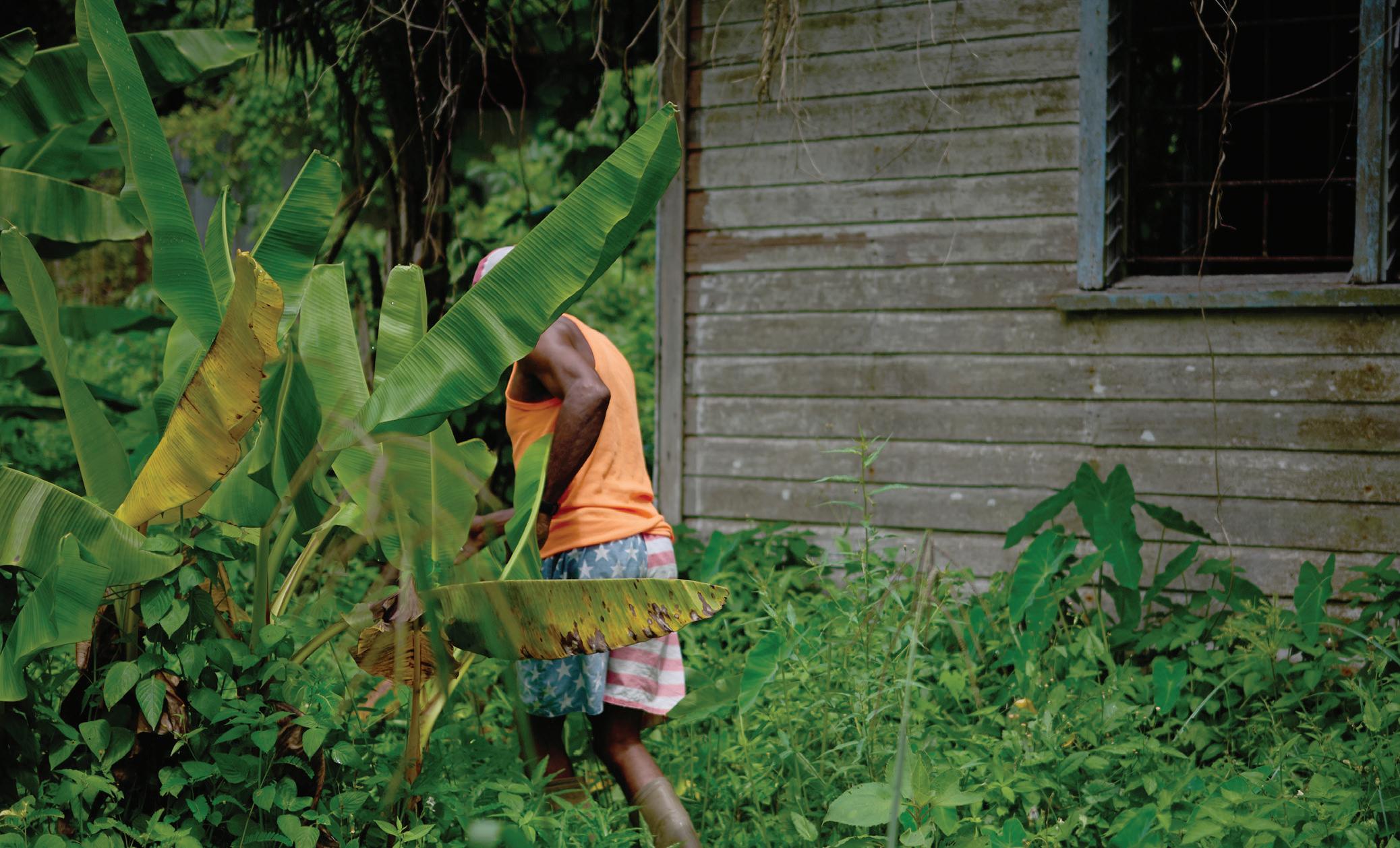
Lumber is transported on bamboo rafts down the river. These makeshift boats can only carry a limited amount and are captained by brave loggers who navigate the bamboo rafts down the river to places like Dora and other waterside villages. This method accounts for much of the village’s revenue and is a significant player in the region’s economy.
Orin admits that it is quite dangerous. As he explained the process, “We use bamboo. We cut the wood, load it on the bamboo, and float it down the river. It’s a bit funny. You can bring about 7, 8, or 10 feet of wood, depending on the size. If you look over where you sit, there’s about 100 bamboo pieces in each raft. You put the wood on top and then link it together.”
Even as he gets older, Orin is determined to continue working and does not intend to slow down. He considers himself a hustler

and views the hard work he does as necessary. As Orin shared, “It is not going to be hard for me. I have one job, and I do it. I am a hustler. When a man is a hustler, he can’t be stopped. But if he’s not a hustler, he can’t survive. I’m not talking about thieves; I’m just talking about earning a daily bread.”
But Orin is not all about hard work; he also appreciates a good game of cricket. Dora is a close-knit community. Even as its people are spread out, they still come together on special occasions to celebrate as one. As Orin stated, “We like to play
cricket and other games at the school there. It’s good to see everyone because I just like to keep the fun alive in the community. Every first of August, about 500 people come over.”
Orin has lived in Dora for nearly 30 years, and in those years, he has seen the village change and diversify along with its people. Recently, Orin expressed happiness with the attention being paid to the village. He explained that the government seems to be taking new steps in developing the community, steps he is pleased about. “The President was
up here about two weeks ago. After he came, we got new solar panels. There are still a few issues in the community, but it is a nice place to live.” Orin does not plan on leaving Dora anytime soon. He intends to change and grow with the village.
Dora’s journey from an industrial hub to a community focused on new ventures and sustainable development reflects the resilience and adaptability of its people. Orin’s story is just one of many that highlight the determination and community spirit that define Dora.
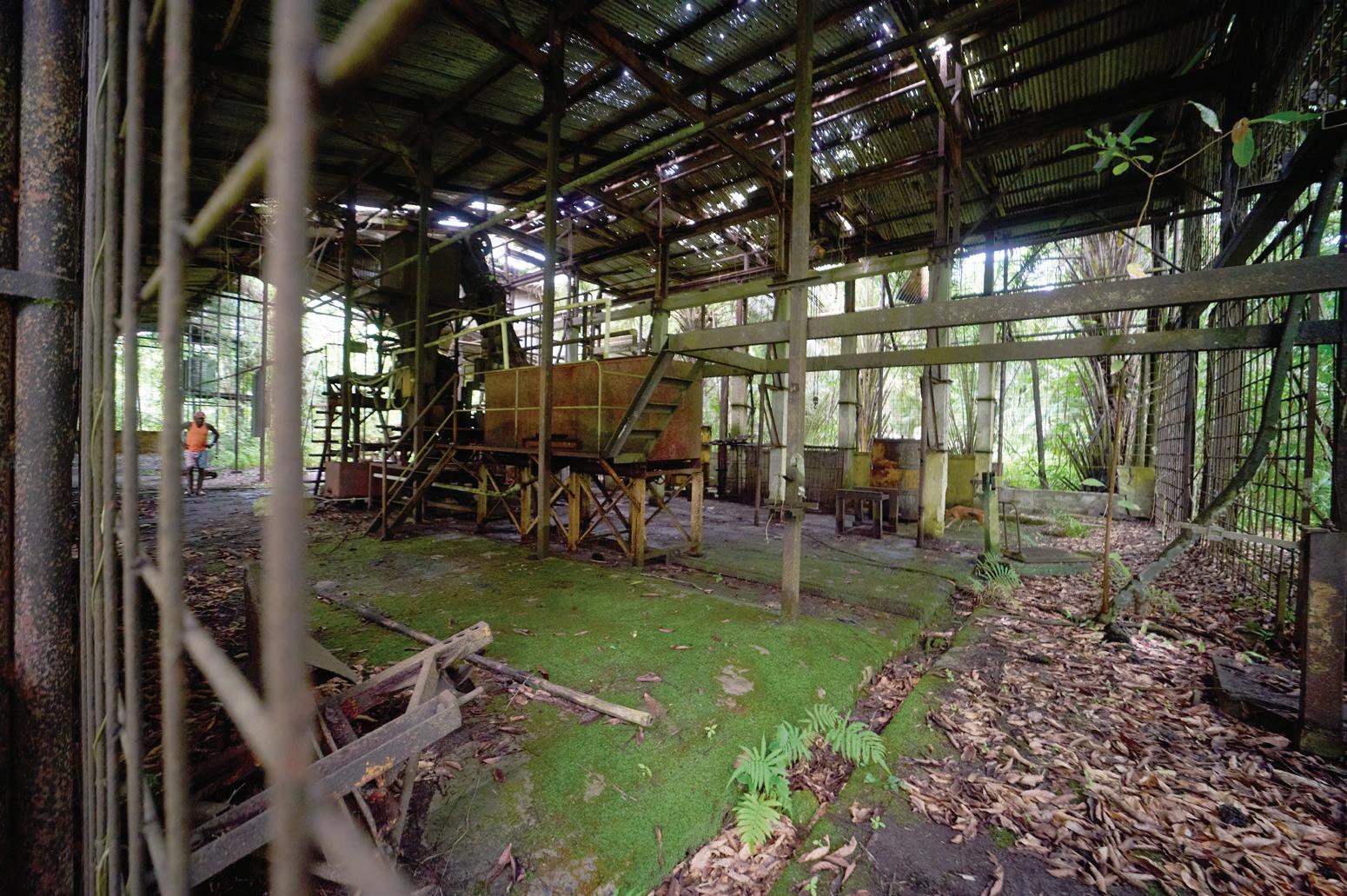
THE warm, steady drift of the Demerara River and the quiet escape of the surrounding hills are just a few things that make the community of Dora what it is. The village is unique in its beauty, location, and people. Dora rests on the East Bank of the Demerara River, some 47 miles from Georgetown, a location not shared by many.
The banks of the river and the captivating Linden hills create an environment that embodies the diversity of Guyana. As the community continues to develop, the people of Dora hold onto their roots and community values, making Dora worth the trip.
Marcellus Cornellius is a son of the soil, born and raised in Dora, and returning to the community to become headmaster at the local primary school. For Marcellus, growing up in Dora was like life anywhere else; his mother handled the discipline while his father worked to provide for the family.
As he stated, “I lived with my parents and my siblings. There were seven of us. I would say two of the most responsible people were my parents. Other than when it comes to discipline, my mother was the one that actually enforced discipline. My father…
would let a lot of kids play. But when it comes to looking after the welfare of the family, that’s where my father came. So it was well balanced. They were basically like the people in the school. So going to school as a child, the school had one teacher.”
They say home is where the heart is, and for Marcellus, home is where his passion was. After attending primary school in the community, he left to pursue higher education, only to return to help Dora’s children.
As he stated, “I’m not sure where I got the ambition to become a teacher from. Probably that came later in life. But what I can say is that Dora is a community that was always there. It is the number one place for me. Even though I went out afterwards, after I finished high school, I started teaching.”
Marcellus embarked on various journeys before settling on teaching. One of his most prominent jobs before attending university and teacher’s training college was in agriculture, a major livelihood of the people of Dora.
As Marcellus explained, “Before I started teaching, I didn’t actually work on a farm. I didn’t know woodwork. Anything you can think about you used to do at that point in time. So,
when a vacancy came for a period at school, my father encouraged me to apply. I stuck with it.”
Attending the Teacher’s College was a big challenge for the young teacher, but graduating was a major accomplishment for Marcellus, his family, and the community of Dora at large. As he stated, “College is like a challenge. Because you have to live here. For the first two years, it was one day a week. So most of the time, I used to walk to College. I had a safe job. So finishing College was a milestone for me.”
He further added, “It was like the first thing to happen for my family. So after College, it took like 10 years before I got to work... Based on challenges, I decided to apply [to teach]. So, after the school, they had a vacancy. And there was a teacher who also told me.”
Job opportunities and population are two aspects of Dora that seem to change over time. Marcellus has been teaching for several years at Dora Primary School. He explained that his class had no more than ten children during the early years. This number has more than tripled today, but this new number seems to be decreasing again.
As Marcellus explained,
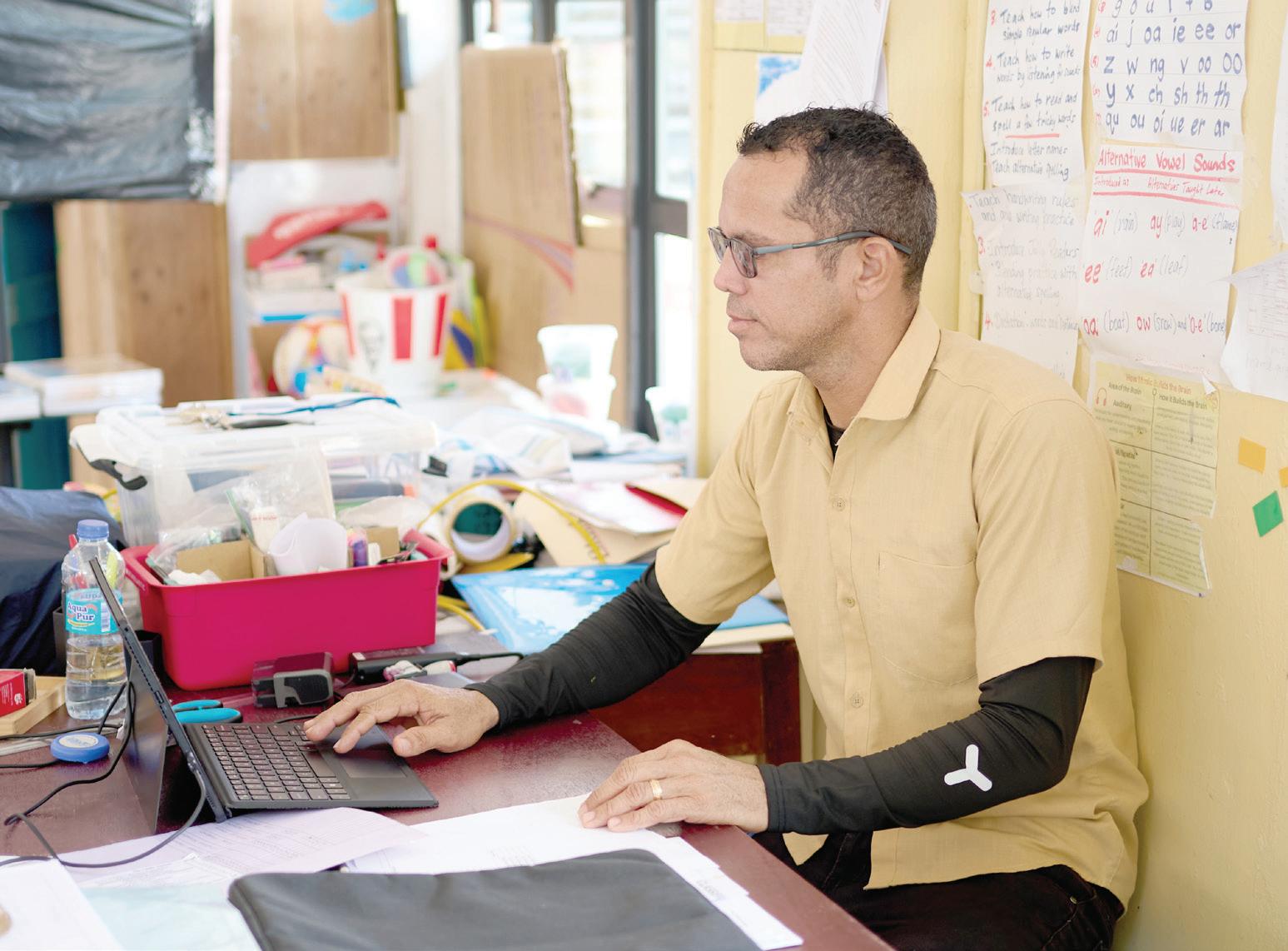
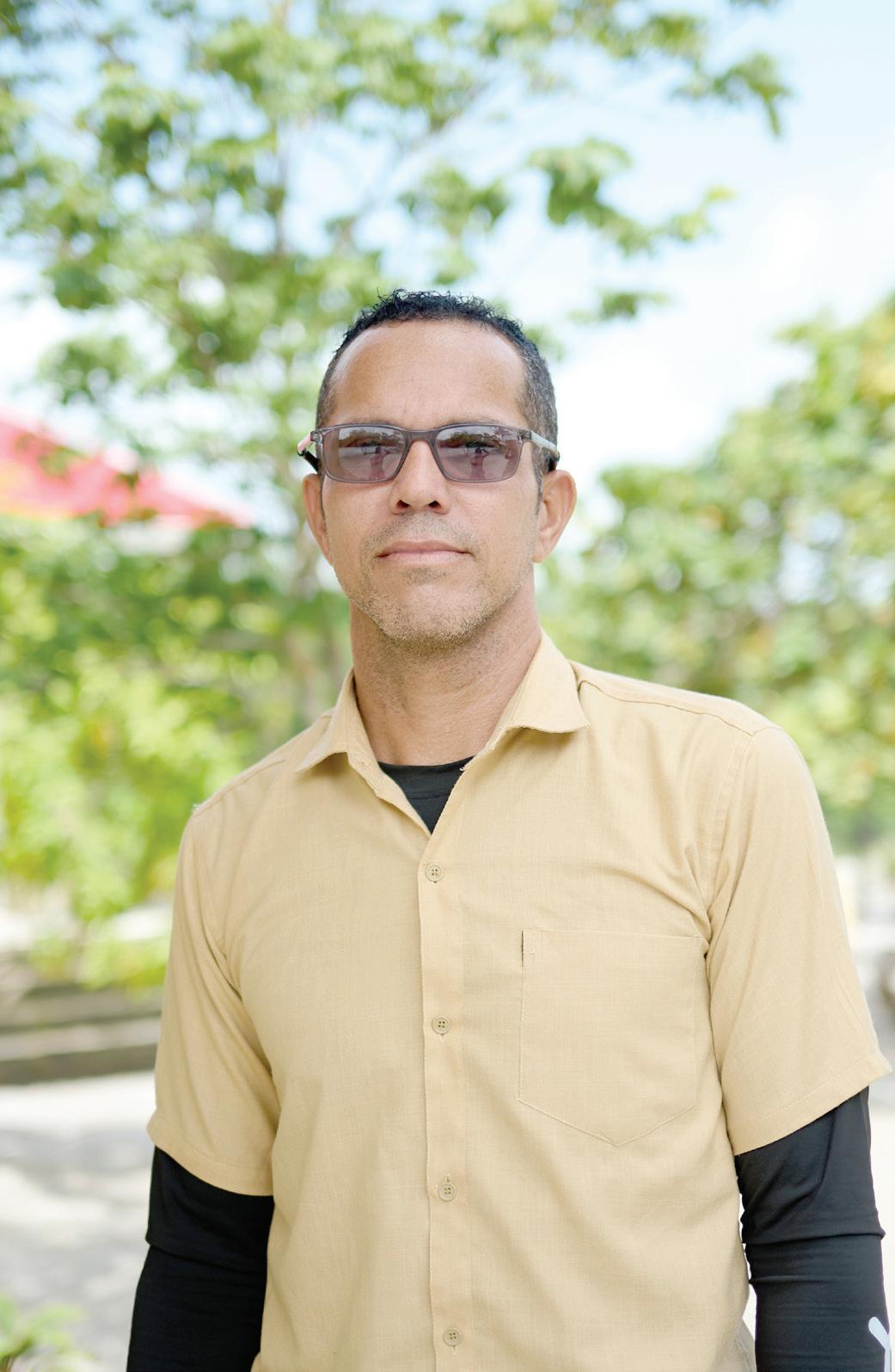
“After my teacher’s time, she got transferred last year in August. So, in terms of job opportunities, there isn’t really a lot. Growing up, I know we had a lot of people here. When I started teaching at school, I had close to 8-10 children.”
As Marcellus elaborated, the lack of work and the fact that Dora does not have a secondary school means a dwindling population. As he stated, entire families move when children graduate from primary school. “We would find that every time the [National] Grade Six Assessment was written, parents, because of the hardship of finding a job travel every day. Most of the time, a child passes Grade Six, they would pack their whole family out and go just to make sure they attended school. If they don’t, then the child stays back here and doesn’t attend secondary school.”
Despite the challenges, Marcellus and his fellow teachers are passionate about their work and continue to champion the greater good of Dora.
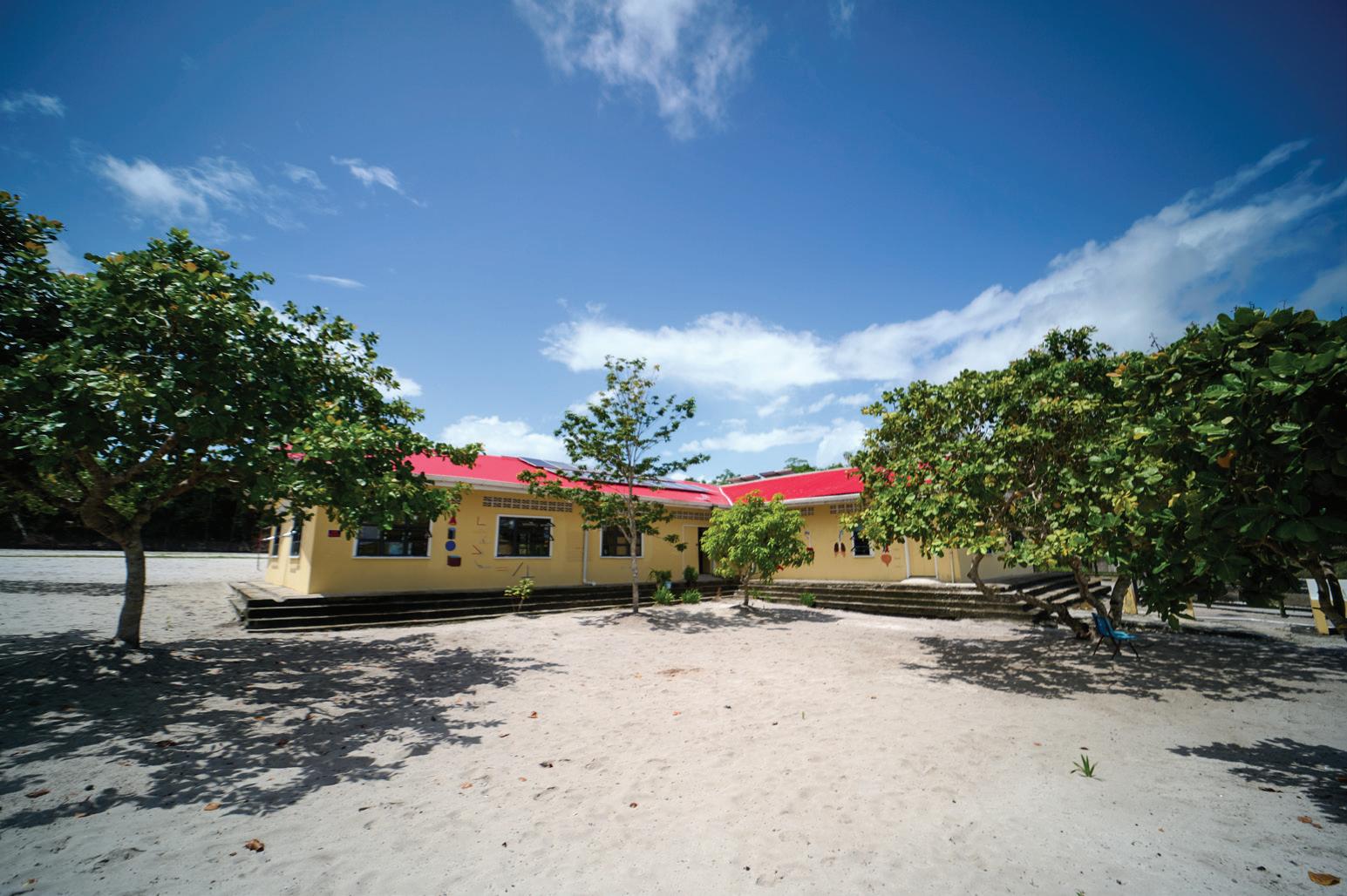

MOST mornings, Olinda Rampersaud captains the boat that takes the Children of Dora to school. Dora is a part of a few communities along the Demerara River. With an estimated population of less than a hundred people, Dora is among the smaller villages in the region. Olinda Rampersaud was born and raised in the farming community. Today, she plays a major role in Dora. During Olinda’s schooling days, she and her peers traversed among the dense trees to get to school and now, the community has changed a great deal. Although Dora has a long way to go, the people of the village are sure that their home is set to see greater times.
Olinda has called Dora her home for as long as she can remember. Unsurprisingly, she works with the community’s children, captaining the school boat. This is an important role in the riverain village of Dora. As she explained, it is not the most lucrative job, but it is what her father did, and she continues to do it. As she shared, “My father used to captain the boat. When he first started, we only had a few children at the school.Today, we have more children.”
Dora is what many consider a school community. The school is the focal point of the community, and the children are the village’s priority. As Olinda shared, Dora is home to a good school and a great health centre. These are newer additions to the
community. During her time in school, Dora did not have roads. This made travelling to school a dangerous pursuit, but one that the children did with much enthusiasm. As Olinda stated, “Today we have a school boat. When I used to go to school, we used to walk, and we did not have roads. We would talk through tracks to get to school.”
An issue that Dora is still combating, however, is children pursuing higher education. Olinda is among a few people who did not get an opportunity to attend high school. As she explained, because her family stayed in the village, so did she. As she got older, she helped on the family farm and eventually took the position working as captain. As she stated, “I
went to Primary school in the community. But I did not get to go to high school because my mother and father stayed here. So I stayed home and helped out on the farm.”
Logging and agriculture are the two main economic activities in Dora. Most men take to logging while many mothers farm an array of crops. However, a new and emerging venture is that of sandpits. As Olinda explained, the community is home to two sandpits. This industrious business has had countless impacts on the community, some good, others taking a toll on the community.
As Olinda explained, roads are a major issue in the community. She explained that, with in -



creased vehicular traffic, the village’s sand roads are slowly deteriorating. “I think the sandpits are a good thing. The only problem is just the damage to the road and so on. The hole in the road just got bigger and bigger and bigger. Because it is sand and the sand gets soft.”
According to the information given, however,
work is scheduled to begin on roads in the community.
Dora has come a long way in development as well, says Olinda. Looking back at her days in school, Dora was a much smaller community with far fewer facilities. She cited the school and the health centre as just a few of the changes. “The community has developed. First we did not have a health centre, but now we have one. We did not have a proper school. Now we have a good school. First, we used to walk to school. That was the only way to get to the school.”
As far as the community has come, Dora still has its challenges, with higher education being the biggest. Dora is miles away from any high school. Olinda is among the countless parents leaving the community to give their children a better education. Olinda explained that her child recently wrote exams and she is ready to leave Dora to send her children to school. She recently acquired a house lot, a great accomplishment and the first of many bigger steps.
The community spirit is one of the most prominent and beautiful aspects of Dora’s culture. The close-knit community was developed by families looking to settle. This created a culture of togetherness in which everyone knew each other and had a profound respect for the other. “The relationship between people is good. Everybody lives good with everybody else. It was all right when I grew up. I was raised like that,” she shared.

GUYANA is home to countless communities that showcase agricultural excellence, and farming in Dora adds another dimension. The people of this riverine community have taken innovative steps in agriculture. Farming on the banks of the river in sandy soil is no easy task; with the added pressure of climate change, Dora farmers have had to rethink many of their traditional practices.
Among them is sixty-four-year-old John Rampersaud. When his crops began to wither due to harsh weather, John began teaching himself new farming practices. These practices, he says, have saved his farm and are alternatives that he believes other farmers in Dora should learn.
The origins of Dora are mostly a mystery, but according to John, a lifelong villager, Dora began as an Amerindian mission and was home to the Wai Wai people. As he explained, “Dora was an old Amerindian mission. I think the Wai Wai tribe used to live in Dora years ago. I think there are only two places in Guyana where the Wai Wai tribe used to live, and Dora was one of them.”

portation. When we plant and get our produce, transporting it is a big, major problem.”
Like many of Dora’s older generation, John was raised in agriculture and continues to farm years later. However, transporting produce is a major issue for a community bordering rivers and hills. As John stated, “After leaving school, I started to work with my parents on the farm. Until now, at the age of 63, I’m still farming. Some of the major problems in Dora are related to trans-
A community leader in his own right, John shared another plight of Dora farmers: prices. As he shared, “When we take our produce to the market, let’s say pumpkins are selling for $150 per pound; we might only get $50 per pound. We, the farmers who are doing the hard work, never get a fair price. I mean, not even a quarter of the price; we always get below, just about a quarter or a little over that.”
Population decline is also something that John says has had a drastic impact on the community. With fewer peo-
ple in the community, there is less work. This trend has led to many people leaving Dora in recent years. As John stated, “Dora community is getting smaller now because the population is decreasing. They are moving out from the area because Tiwari has bought out the land here at Dora, and most of the people are moving out. So Dora, I must say that the community is getting smaller. The population is going right down.”
Regardless of the challenges Dora faces, the community spirit persists. The villagers make time for community gatherings, showing that the spirit of Dora lives in its people. These small cele-

brations often garner support from villagers who have left and new people. “Sometimes we just have a little cricket and things. But right now, the playfield is very bad. In the old days, I had my own playground up there; I built my own playground at the back here.”
With challenges surrounding agriculture everywhere, the added pressure of climate change has made small-scale farming a hard task. As John explained, “I used to plant a lot of bananas earlier, but then we got a disease. So we changed from that to planting cash crops. Right now, we have pepper in the greenhouse and things like pumpkin, karela, okra, greens, and vegetables.”
He further explained that his challenges are not unique. Climate change has brought many issues that John and other farmers sought ways to deal with. “The climate change and the different weather patterns make it difficult. So now, when you plant outside in the open air, when the rain falls and you get all types of weather, the plants don’t last long; you get more stress, a lot of disease. But
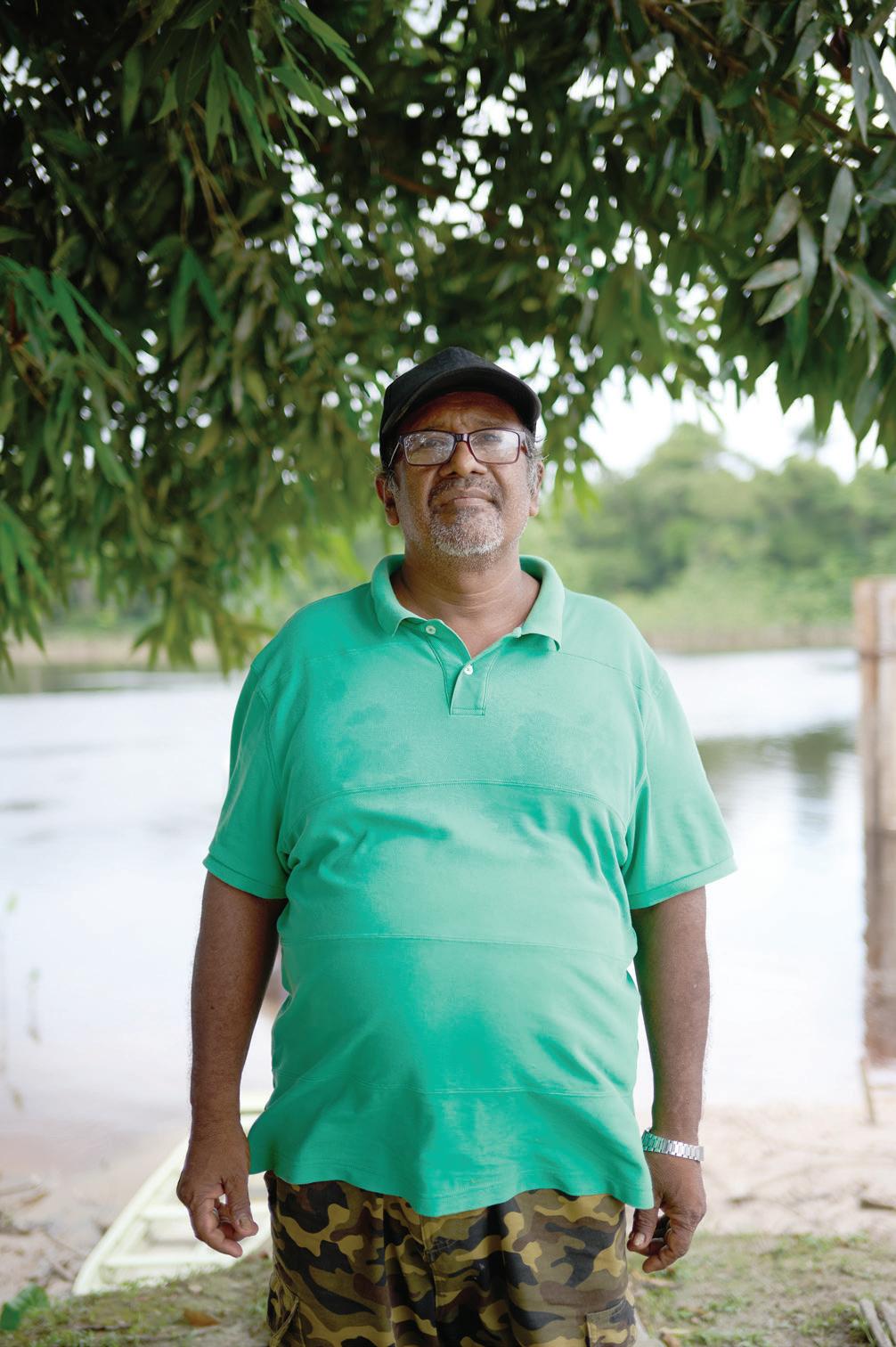
under the greenhouse, where you control the water, you limit the water and give it to the plants when necessary.”

John has taught himself the dos and don’ts of greenhouse farming, an agricultural practice unfamiliar to the farmers in Dora. John says his new practices have helped him greatly. “So, I find that when you limit the water, the plant grows and lasts longer. I started greenhouse farming about three years ago. The crop lasts a longer time because, outside, pepper plants might pick for about eight or nine months and then finish.”
In John’s case, passion has fostered a necessary know-how. He shared that the little he has learned about greenhouse farming has changed the way he understands agriculture, and his farm has seen great success. As he stated, “In the greenhouse, you can run for over a year and a half. I didn’t have any formal training about it; I have an agriculture book, so I just use that a little, along with my own experience.”
John’s story is a testament to the true innovation of the Dora farmers. Despite numerous challenges, from harsh weather conditions to market pressures, they continue to adapt and find new ways to sustain their livelihoods.

After my last column on the types of people whom I believe everyone should have in their lives, there were a few questions on how to better those relationships once you have them. All relationships require work, willingness and commitment, and there are steps you can take to build healthier ones.
The first and most important question is - What makes a healthy relationship? Many would havemany different answers, but there are general, well-defined universal factors. Healthy relationships share common goals and expectations. It requires a meaningful connection with honest communication, no fear of respectful disagreement and conflict and one that allows for individual identity and freedom of other relationships and interests.
If you’re an avid reader of this column, you know that I continually begin with the self with any topic. You must know yourself before
you improve anything which involves you.The philosopher JidduKrishnamurti said: “A relationship is a mirror in which you can see yourself, not as you would wish to be, but as you are.” This means that relationships expose who you are – your greatest strengths and insecurities. You become vulnerable to both you and others, and feeling safe doing so is the most important factor for being genuine. Therefore, first and foremost, practice ultimate self-care- mentally and physically- to better manage emotions, stress, misunderstandings, and conflict.
Figure out your core beliefs. This sets up relationships in an informed way, as true friendships align with core values such as integrity, equality, and compassion. Of course, it’s hard to find these in others if you aren’t sure which matters to you the most.
Embrace respectful differences. No two people will agree on everything, so when you find that disagreement,
meet it with the notion that unique views bring fresh knowledge and insight to a relationship. Both strengths and weaknesses can complement relationships well.
Based on core beliefs and differences, communicate and maintain healthy boundaries. Even those who know us best are not mind readers and need our thoughts and feelings clarified. Relationships will always be better when vulnerabilities are cherished rather than chuckled about. There comes a time in any relationship where you see insecurities,which should always be protected, as exploiting these in any way will chip away at a relationship little by little.
Listen well. Most people emphasise speaking and giving advice, and while that’s beneficial, people feel most valued and understood when they feel heard. When you’re truly listening, emotions can be heard, and a more meaningful connection can be built.
Practice compromise.


All relationships are built on a reasonable exchange of give and take. If you expect to always get what you want

in any relationship, you are essentially just waiting for disappointment.
Practice healthy and safe conflict resolution. Since conflict is inevitable, the people around you must feel safe to have differing views. A fair fight- one without insults, blame, revenge and grudges- must be had. Always remember that you are arguing with someone you love, not the problem itself and that you need to focus on the problem itself and not the one you love.
Practice forgiveness. If those around you have to constantly prove themselves or fight to be in your life, they won’t be forever.
Take breaks when needed. Most people feel the need to fix things immediately when there is a disagreement.
However, being unable to take a step back and take some space proves that you don’t feel secure in the relationship; space freedom speaks to security.
Show appreciation, always. This may sound obvious, but I’ve seen so many who feel entitled to have their needs met by close friends/ family when the truth is, no one really owes us anything- they choose to cater to us and more often than not, it’s because of our gratitude.
Respectful but brutal honesty, in my opinion, is necessary for a healthy and trusting relationship. Strangers may already lie, and enemies will be negatively cruel so who else is best for the truth? The reverential truth about what you’re excelling in, what needs improvement, about the other people around you and when you derail a little. Brutal honesty is the way to clarity.
Fight with intention. Conflict is inevitable and powerful becauseit can make or break relationships. When we find people who can handle conflict respectfully, we gravitate towards them and retreat from those who do not. Be constructive during disagreement- it’s not the person, it’s the problem so focus only on the solution.
Finally, one of the most important practices in any relationship is relational mind-
fulness, as we are relational beings. Relational mindfulness is based on the premise that the foundation of love is attention and, therefore learning how to not only stay present during interactions but to also pay close attention and be fully engaged during them. It cannot happen overnight, but it is a skill that anyone can cultivate over time. The next time you are in a social setting- pay attention to your friends. Are they comfortable? Are they actually enjoying themselves? Have certain topics or interactions made them uncomfortable? When we practice the attention required in relational mindfulness, we cultivate empathy, compassion, and understanding in our relationships- ultimately making us better to be around.
What can you do to allow for others to want to strengthen their connections with you? I can recommend the trait I look for for the person to become a daily part of my life- well roundedness. My inner circle is compiled of only well-rounded people which means I can go to them for fun, to be healthy, work, advice, to gossip, to share my darkest secrets and everything that that day requires me to be. This is rare, that one person can do it all but I’ve been lucky to find a few and if you are capable, be a well-rounded person and friend.




FROM PAGE II from you than your ability to walk.”
Thanks to her persistence and perseverance, Suzana feels her hard work has paid off today. Now, she never loses hope, and continues to set goals, big and small, despite her adversities.
In 2023, she and four other wheelchair users started a non-profit organisation called Guyana Association for Persons with Physical Disabilities (GAPPD), and being one of the executives allows her to help other persons like herself, especially newly injured persons who feel that it’s the end of the world for them.
“Also, I’m so happy to say after almost a decade, I got back into the driving seat of a car and started driving again, only this time with a hand control device attached to my car, which was something I’ve never thought I’ll be able to do again. But I knew for a fact that once I was ready mentally, I was going to accomplish that achievement of driving again.”
“I’ve gained so much independence back from this achievement. It also gives me a sense of freedom, and knowing that I can do anything regardless of being in a chair is more than liberating.”

Thanks to her persistence and perseverance, Suzana today feels that her
Suzana stressed the importance of having positive and supportive people around you when you are faced with situations like hers. “When you sustain an injury such as spinal cord injury, it is impossible for you to do it all on your own. It takes a village, positive and supportive people behind you pushing you even when life seems meaningless. I’m truly blessed beyond measure to have supportive and caring parents and siblings. Without them, I wouldn’t have been here today.”
She advised: “Always remember, however bad your situation may be, there is always someone out there that is in a way worse position than you are; trust me. You’re here for a reason; you have a purpose. It’s okay to have bad days, but never let it suck you in and consume you. Look for that little light at the end of the tunnel. Never hesitate to ask for help or if you need to talk to someone. Your disability doesn’t define who you are. Don’t ever limit yourself to anything; you’re just as equal as anyone else. Visualise your goals and work towards achieving them no matter how long it takes.”
Aggression is often mistaken for assertiveness, but these are two completely different reactions. These are both communication styles or reactions. We all should stand up for ourselves, what we believe in and what we want. However, we can do so in a way that is responsible and respectful. To be assertive means to be forthright and straight with what you want while simultaneously taking other’s needs and wants into consideration. In contrast, aggression involves acts of self-interest and does not consider others or their feelings.
The most important thing to note is the tone and attitude
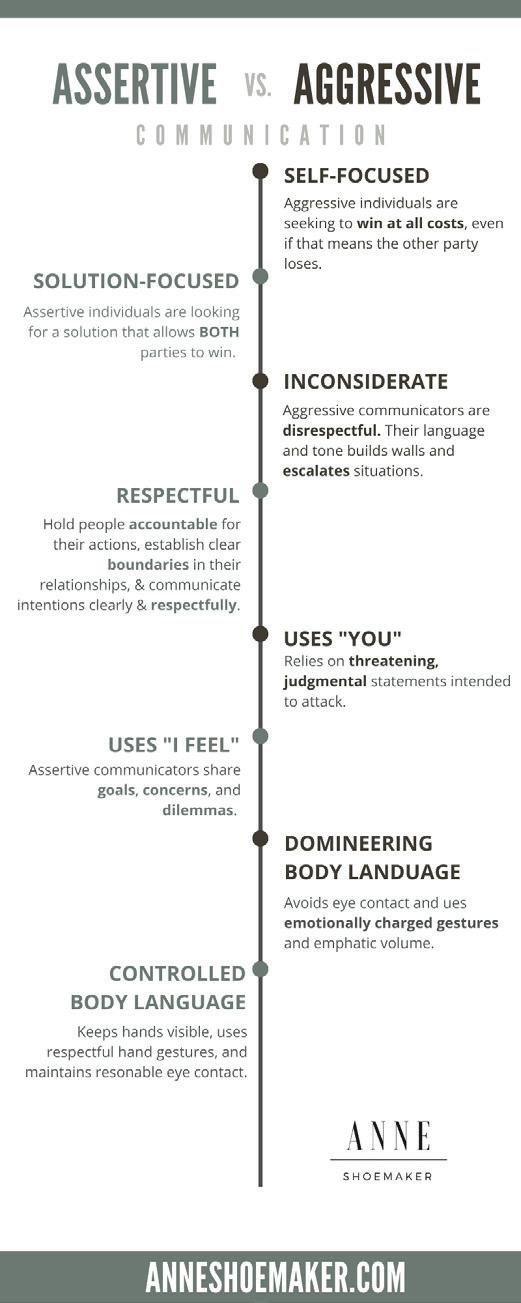
during these communication responses. A person can have their own opinions and feelings, but that does not mean it can be rooted in disrespect towards others. Personally, that is a key distinction. It is unacceptable for people to use aggressive language or tactics and mask it as “I’m standing up for myself”. Assertiveness leaves room for effective communication, cohesion and accountability.
Sometimes, we may mistakenly use aggressive responses as well without knowing. As such, it is also important for us to recognize these flaws and make a conscious decision to respond better. In places of work, teamwork and collaboration requires effective communication—the
SEE PAGE XVI



AS a parent, I have wrestled with the beast of drug addiction. I have covered medical papers in search of applicable answers. I have found data descriptions of its impact on the brain, the nervous system and its effects on the body with age, based on how the addict, on his/her own, sleeps in the open or in a drug yard with other addicts infested by other illnesses. But especially by those who are particularly affected by direct exposure to weather and infected surroundings. It’s an overburden on a citizen not directly in the medical field or without millions in the bank, allowing for disposable investment in addicted relative/s but seeking answers from imposing casualties of this infection that cannot be avoided.
Casual observation of the twisted shapes of addicts upon queering with some victims who may have been colleagues of past times did produce relative and logical attention to clarify guesswork with logic.
The substances now sold to victims are chemically adjusted to sustain addiction. The victims are numerous. Strange new faces are common, especially younger ones. The real victims, however, are the parents, guardians and siblings who care. I have no data on this following observation, but I believe that the character who embodied two personas - Dr Jekyll and Mr Hyde - from Robert Stevenson’s 1886 classic novel may have been an addict. This conclusion I arrived at emerged from the conflicting, extreme person-
alities I have witnessed on my own turf and from the many reports from families who lost loved ones at the hands of addicted kin in Guyana.
There is one contention of whether an addict can forgive himself/herself for his/her severe indulgence in crack cocaine, marijuana or alcohol and reconstruct a reality of breaking free --- to step into the next day, a starting over, which will be based on that person’s mental and spiritual strength to not judge one’s self against peers that have gone ahead, and thus, proceed to create a false victim persona in confrontation with the guilt of time lost, that can lead down the slope of relapse. Even a traumatic self-imposed experience of yesterday can prove an asset if re-explored, using

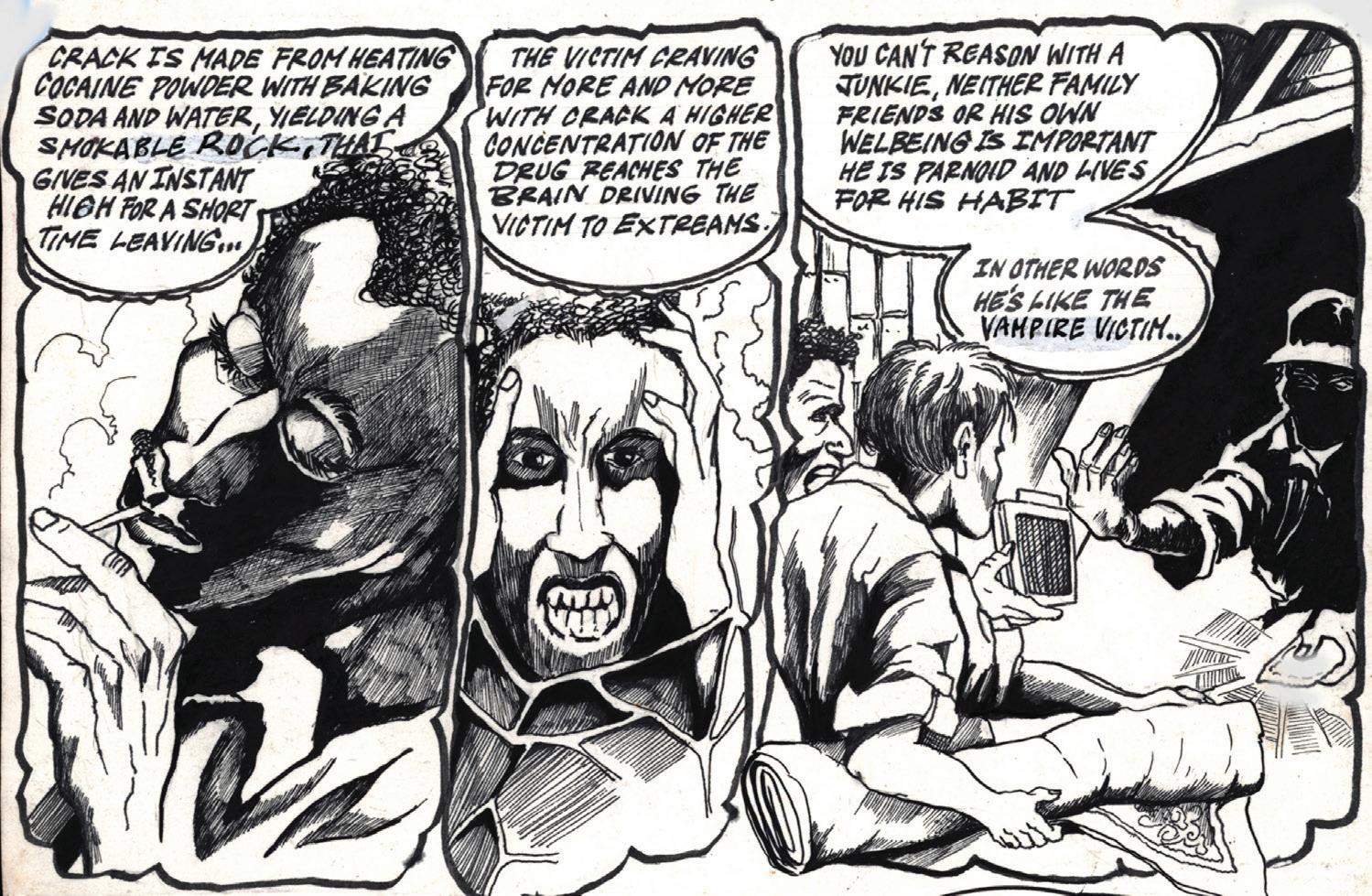
all the elements of what was learned as tools for a better understanding of the mood that will guide the next steps forward and, if allied to a teaching platform, can help others in need.
I spoke to a teacher recently who alerted me to the fact that other stuff like molly- MDMA has been introduced to students in Guyana.
This is also a life-damming drug that can mirror cocaine in its effect. What is evident is that our livelihood has become contentious. The teacher also enquired if the thing we did in the past is still active. She was referring to RESCU; some colleagues and I used to visit schools talking about the effects of Drugs on the mind. We did
this with some folks from the Ministry of Education on occasions.
We didn’t get the support, and people drifted on. But I assured her that, in the future, if needed, I would be willing to revisit that programme because my consciousness is still alert.



PINK ribbons fluttering in the wind, coming closer and closer then drifting away, lost in the far horizon.
Brandon sat up in bed, awoken from his sleep again by the strange dream. He sighed, got up and, sliding open the glass doors on the upper balcony of his home, he stepped out and sighed again.
When the dreams began, he did not think that they may have some meaning, for, in his view, dreams were just an unending series of thoughts and images occurring in a person’s mind.
But now he began to wonder.
“Why am I having this recurring dream of pink ribbons in the sky?”
He tried to think of something that may have connected him at some time, somewhere, to the ribbons, but found nothing. The one odd thing about the dream, he now recognised, was that it only happened when he was home, not on travels.
Brandon was a successful cricketer, a recognised no. Three batsman for the West Indies team, so he was more overseas than at home in Guyana.
“It means,” he surmised, “the dream has to do with something or someone here.”
He was on a break from cricket, but his daily schedule was so hectic, the dream was pushed to the back of his mind until he saw the little girl.
He had visited Leonora Primary School on the West Coast of Demerara to donate some cricketing gear when he noticed a pretty little girl sitting quietly in a corner of the classroom. She had long hair tied with ribbons and was shy and soft-spoken. It was at that moment the meaning of the dream hit him. The pink ribbon was an image from childhood that had been repressed in his mind.
“I had a friend!” he exclaimed to himself, “A little girl like her.”

At home alone, with time to think, memories of her flashed in his mind, touching something in his heart. He had seen her for the first time almost 12 years ago when he had spent some time with his aunt in the countryside. Thick hedges and tall trees hid the house next door with huge sprawling limbs that gave the place a dark, mysterious look. His aunt had forbidden him not to go close, but Brandon, the curious young boy, wanted to know what was hidden behind the thick hedges. He managed to cut a little opening but could see just a little part of the yard and as he watched a pitbull came into view.
“Darn!” Brandon exclaimed quietly, pulling back. A few days passed, and Brandon did not peep through the small opening again, although he was still curious. Then, early one morning, he was awoken by a soft, sweet voice singing. It was coming from the house next door, and scrambling out of bed, he ran downstairs to the hedge and cautiously uncovered the opening he had made but saw no one.
The voice was coming clos-
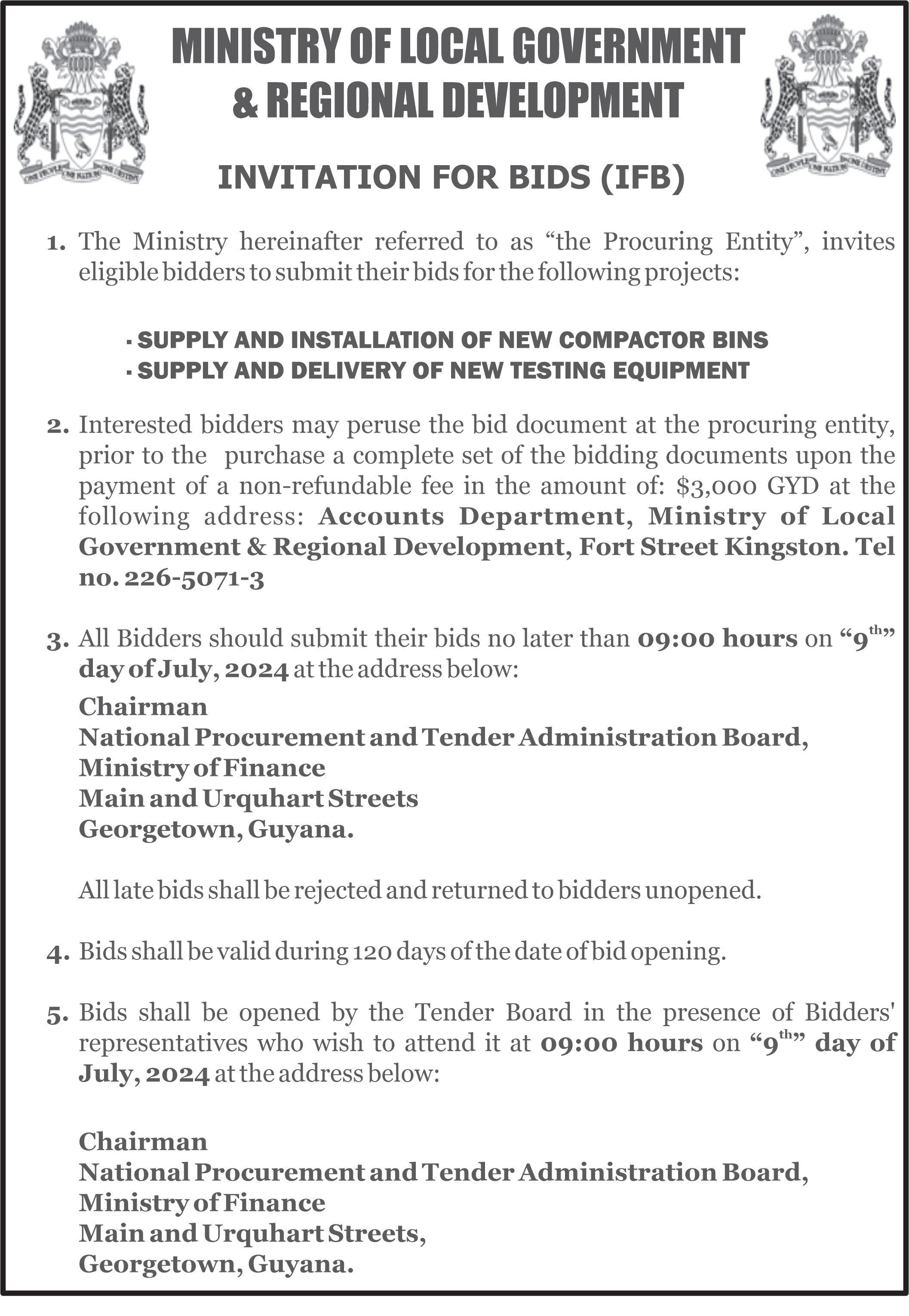
FROM PAGE XV
er, and then she came into view, walking barefoot in the dewy grass, her long hair tied loosely with a pink ribbon and a small basket filled with flowers on her arm. Her simple beauty sent a warm
feeling in his young heart, but what actually touched him was the sad tinge in her voice.
The story in the neighbourhood was that the young girl was literally imprisoned with her mother in that house by her tyrant step -
father. Brandon knew that if there was anyone who needed a friend, it was her, and he wondered how to get her attention. Then, one day, whilst watching cricket, he realised he could hit a ball like a six over the hedge when she was in the garden.

So he had bought a pack of flannel balls and taped a note on the ball that said, “Hi, my name is Brandon.”
He had waited early the next morning when he heard her singing and he took average of the shot and hit the ball over the hedge. He heard the dog barking. Then there was silence.
The next morning, thinking whether he should hit another ball over with a note, he saw a pink ribbon stuck in a corner of the hedge. He took it down and written in neat, small letters were the words,
“Hi I’m Deepika.”
“Yes!” Brandon expressed in delight, and that was how they began communicating.
Day after day, through the opening in the hedge, he had become her friend, a warm friendship that had brought a smile to her lips and a light in her soft brown eyes. But regrettably, the time had come for him to leave, and on that day, he did not see her, but stuck on the hedge was another pink ribbon, and she had written,
“Thank you for being my friend.”
He had kept the ribbon, hoping one day to see her again, but as the years passed and his cricketing career took off, he became famous and rich. The ribbon got lost somewhere, and the little girl he had befriended faded from his mind.
Brandon sighed deeply and shook his head, “I left and never returned,” he said with deep regrets, “How could I have forgotten her?”
He knew he had to find her. He travelled to her village in the countryside of West Coast Berbice, but when he reached there, his hopes were shattered, as she was not there anymore.
His aunt told him they had left, mother and daughter, eight years ago to get away
from her brutish stepfather and no one had ever seen them again. Brandon stared at the hedge, not sure now what to do when his aunt handed him a folded pink ribbon.
“She left this and asked me to give it to you, if you ever came back to look for her.”
He unfolded the ribbon slowly, and two words were written on it: “Find me.”
Eight years ago, she had left that note, and he wondered if life had been harsher for her.
He folded the ribbon neatly and put it in his pocket, a promise in his mind.
“I will find you, my friend.”
He was not sure, though, where to start in a country of ten regions, with no forwarding address nor any family connection to mother or daughter, and, most importantly, how would he recognise her from twelve years ago when he had first seen her?
For days he tried visualising what she would look like now, as a young woman drawing sketch after sketch, for sketching had been one of his hobbies since at school. Finally, he got something that he felt could give him an idea who to look for. He travelled all the regions on the coast but could not find her. Days matured into weeks and a measure of desperation crept into his mind. Then, one night, he saw in another dream, native children sitting under a huge tree, listening with rapt attention to their teacher, whose face he could not see. Then, one child raised her hands and said, “Miss Deepika.”
Brandon snapped out of his dream and sat up so suddenly he almost fell off the bed.
“Yes, of course,” he said excited, “she had said she wanted to be a teacher. Thank you, Lord!”
Now, the task was finding which region in the interior, and that was where
recognition of a distinction between aggression and assertiveness is necessary. We should also actively practise being more assertive and less aggressive—even when angry or frustrated. Aggression only increases problems and challenges. This does not mean that the other receiving side should take advantage of a person’s ability to be assertive and not aggressive. Respect and effectiveness in communication should be
his Amerindian friend Antonio came in. Brandon sketched the picture he had seen in his dream, and Antonio immediately recognised the place. It was in Region 8.
The next morning, he travelled by land to the Hinterland region, reaching at nightfall. The anticipation of seeing her after all these years tied knots in his stomach and the night seemed so long.
In the morning, he travelled from the guest house to the village and he saw the same scene. She was sitting in a chair under a huge tree, her hair wrapped at the nape of her neck, reading to the children. He did not see her face but knew it was her in his heart.
“Deepika,” he called her name quietly.
She stopped reading, turned around and rose from her chair. He felt the rush of relief and joy as he looked at her. Her living image wasn’t far from the one he had sketched.
She was so beautiful! She looked uncertainly at him for years had changed him from boyhood to manhood.
“Do I know you?” she asked in a soft, pleasant voice.
He took the ribbon from his pocket and held it up, saying,
“I got your message.”
She gasped and dropped the book.
“Brandon.”
“I’m sorry I took so long to find you,” he said, voice almost breaking.
“After all this time,” she said through tears, a little tremor in her voice, “I thought I would never see you again.”
“It’s God’s work,” he said, wiping her tears, “and now I have found you, I want to have you and our friendship in my life forever.”
She smiled and he hugged her in soft embrace.
A bond tied by a pink ribbon.
FROM PAGE XIII
extended to both parties.
Instead of making demands or threatening someone, you can be assertive by making requests or suggestions. Instead of attacking or demeaning people’s positions, you can explain what yours is. Instead of having a “win-at-all-cost mentality”, you can try to have a “winwin” mentality. Instead of speaking over others, try to compromise and establish boundaries.
You do not need to be a people-pleaser. You mustbe more mature and respectful in communicating your thoughts or emotions. To be aggressive solves nothing. Being assertive promotes growth and encourages collaboration. It’s up to you to decide which approach you’d prefer and what consequences you’re willing to face.

WHEN the Private Sector Commission (PSC) held its Annual General Meeting in May, the President, Dr. Irfaan Ali, gave the feature address. One of the main themes of his address was that the banking system reform was necessary if the economic revolution the country was now undergoing was to achieve its fullest potential in the shortest time.
We will consider banking reform from both the macro
and micro standpoints, and instead of trying to reinvent the wheel, we will mention President Ali’s valuable recommendations on the overall reforms before touching on the more minor day-to-day functionality of banks.
The banking system will have to adopt the techniques and culture of greater innovation and proactivity and adapt itself to the country’s new dynamic economic environment, which has expanded beyond the oil industry. By
so doing, the Banks will be involved in capital formation and broader economic development. “Yet to this date”, said Dr Ali, “ the banking sector has not responded with the speed, efficiency, reliability and time to exploit the opportunities that are here in Guyana”. Instead, the Banks, as a whole, have confined themselves to their traditional role of receiving deposits and making lowrisk loans. This traditional way of banking can still pro-

duce healthy balance sheets and good profits, and banking shares are among the most traded, but President Ali pointed out that this traditional role is very limited.
“The role of the bank,” said President Ali, “is also seeking the opportunity to understand where the economy is going, to create an ecosystem to support where the economy is going and to build upon what is happening in the country.
. . Our local Private Sector and local leaders are doing a
tremendous job in trying to open up opportunities, especially in the non-oil sector, but the speed at which the bank has been operating and processing does not match the type of dynamism that is in the economy.”
In this regard, we will mention a small example of such an opportunity: Among the many programmes with which the State is involved is the renewal of the Albouystown ward which is known as “Georgetown’s
slum area”. Independence Boulevard, which runs the length of Albouystown and, in time, could be made to reach Ogle Airport and, at present, reaches Saffon Street, which leads to the Cheddi Jagan Airport, places Albouystown in the heart of the business development the country is experiencing. All the other streets of the Ward have been renewed and other services such as drainage, fire
SEE PAGE XXII
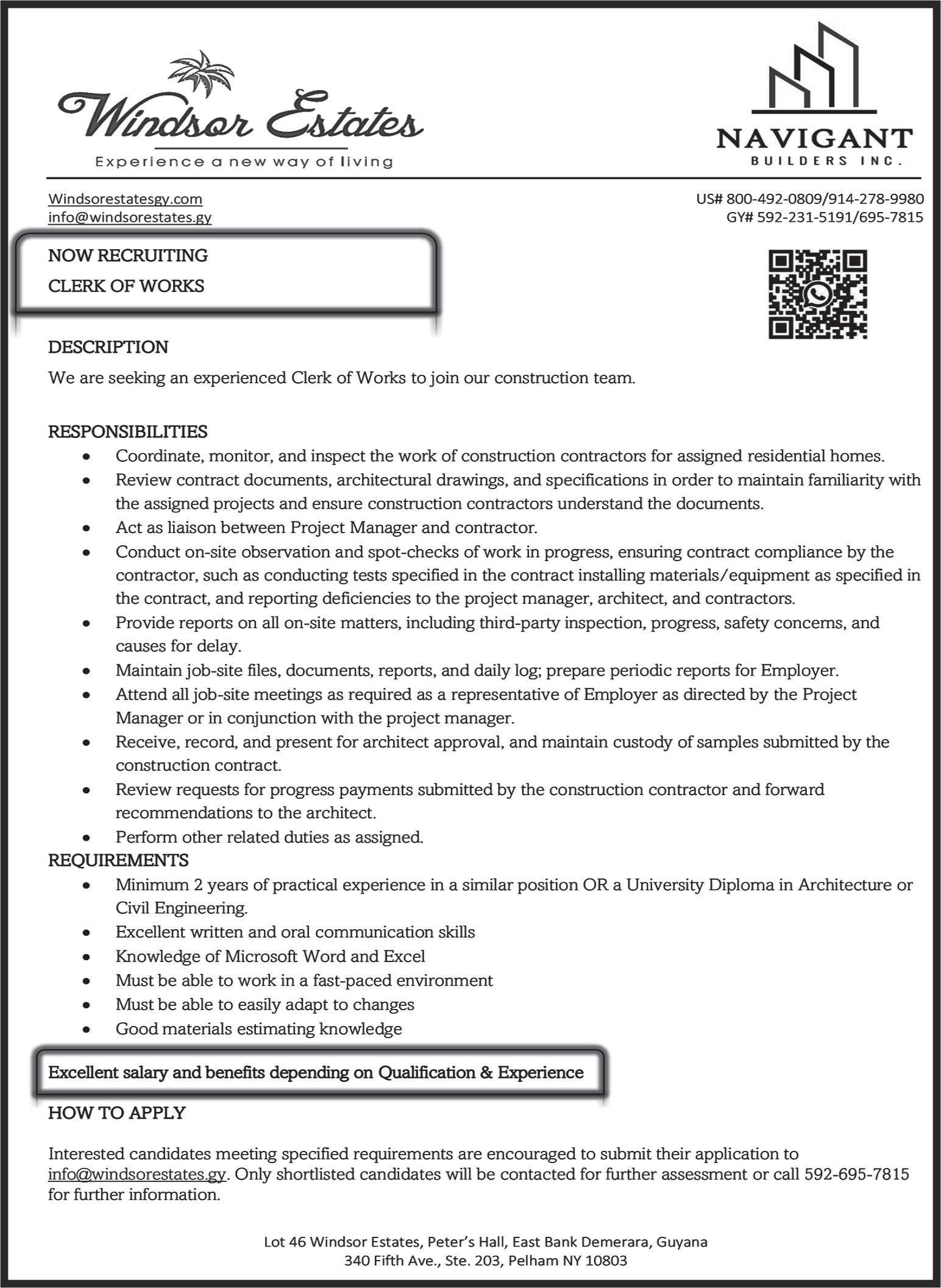




place of work once they could be offered comfortable housing.
prevention and policing have been upgraded and the Ward is again becoming a desirable location as it was in 1906 when, as a neat suburban village, it was absorbed into the City.
Today, with the development of two off-shore oil companies on East Bank Demerara and the growth of numerous businesses and industries along the bank reaching the Cheddi Jagan Airport and the various Oil installations at Vreedenhoop, thousands who work with these ventures would prefer to live in Albouystown because of its unique strategic location and nearness to their
The Guyana Consumers Association has proposed to the Banking system the offer of concessionary loans to proprietors who would construct three or four-storeyed blocks of three-bedroomed apartments with income tax rebates etc. The banking system has been silent on this opportunity.
At the Local Content Summit held earlier in the year, the banking sector failed to take full advantage of networking to bring together capital and human resources to foster the growth of large-scale companies and take full advan-
tage of local content offerings. President Ali sums up the milieu: “This requires a big shift in the business mindset of the bankers and the client. . . It requires the banking sector to use more analytical tools in defining the opportunities for the country, but, importantly, in modelling those opportunities and then going out to their clients”
The day-to-day running of the banks has much room for improvement. There is, for example, the issue of bank charges: These charges differ greatly from bank to bank and are sometimes grotesquely high in some banks. All banks should publish a list of their charges for their


various services so that customers can compare them and avoid being exploited, but the banks would not do so unless the Bank of Guyana and the Ministry of Finance require them to conform.
The banks often cannot sell foreign currencies, especially American and Canadian, because they do not have such currencies in hand. The Banks themselves give conflicting explanations as to why they
cannot provide such currencies to customers. This inability to provide foreign currencies inconveniences small businesses and individual customers and is an issue that the Ministry of Finance should address.
Several banks no longer send depositors monthly statements, so customers do not have the opportunity to check their accounts. This could lead to undiscovered mistakes or even theft.
And if a customer requests a statement of his/her account, payment of a fee is requested.
Simple banking transactions take a long time to complete because the staff, usually intelligent young people, are untrained or not fully trained, and customers consistently complain about the time they have to spend in the banks to complete simple transactions. Sometimes, the sloth of service is due to a shortage of staff. These difficulties could easily be surmounted if more competitive salaries are offered and such improved salaries are paid when the profitability of the banks is taken into account.
Other bank services and charges such as mortgages and collaterals are required, and these need to be reviewed to make them fairer and more consumer-friendly.
The Banking System must reform itself to avoid being uncompetitive when proactive foreign companies enter the Guyana market.
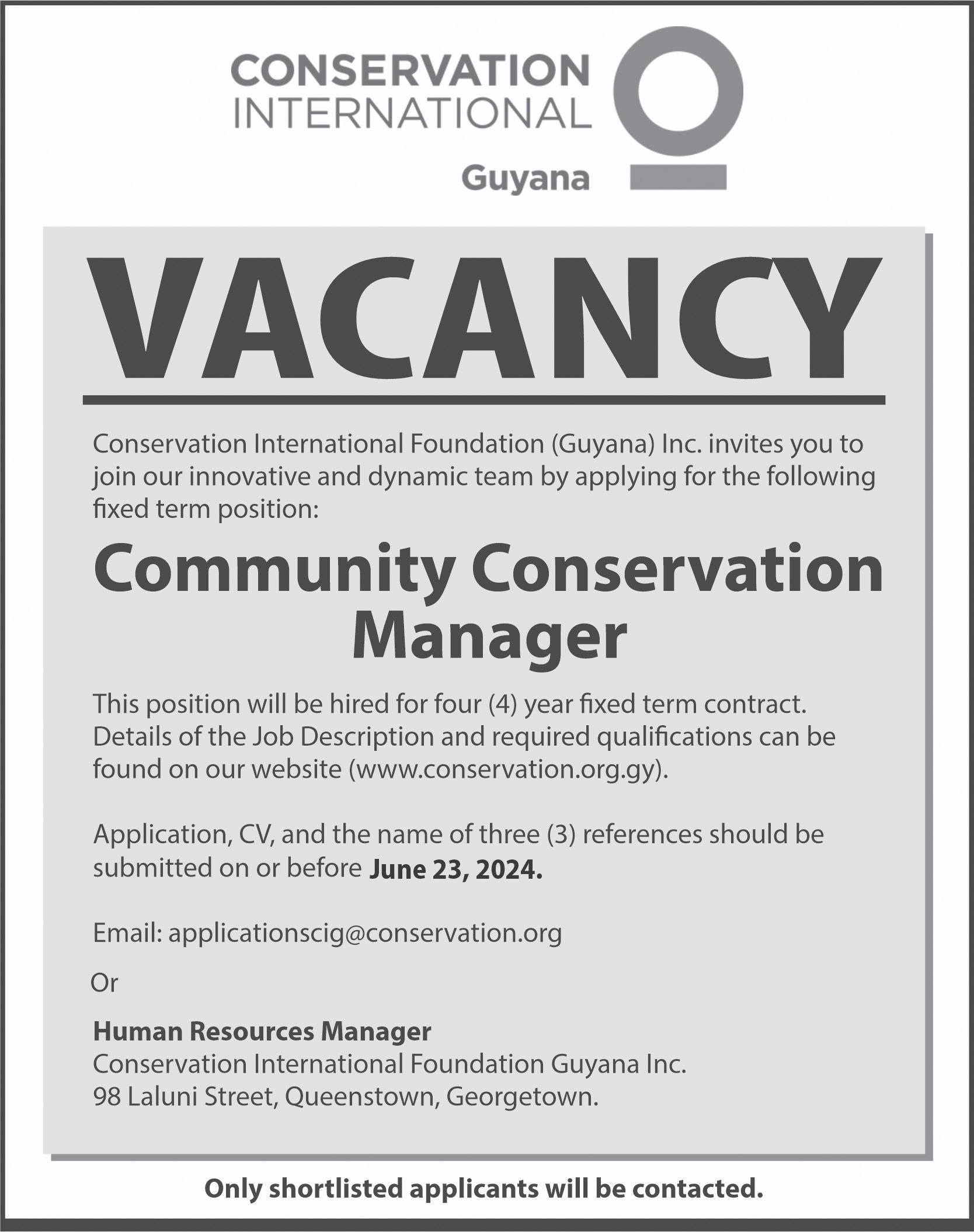








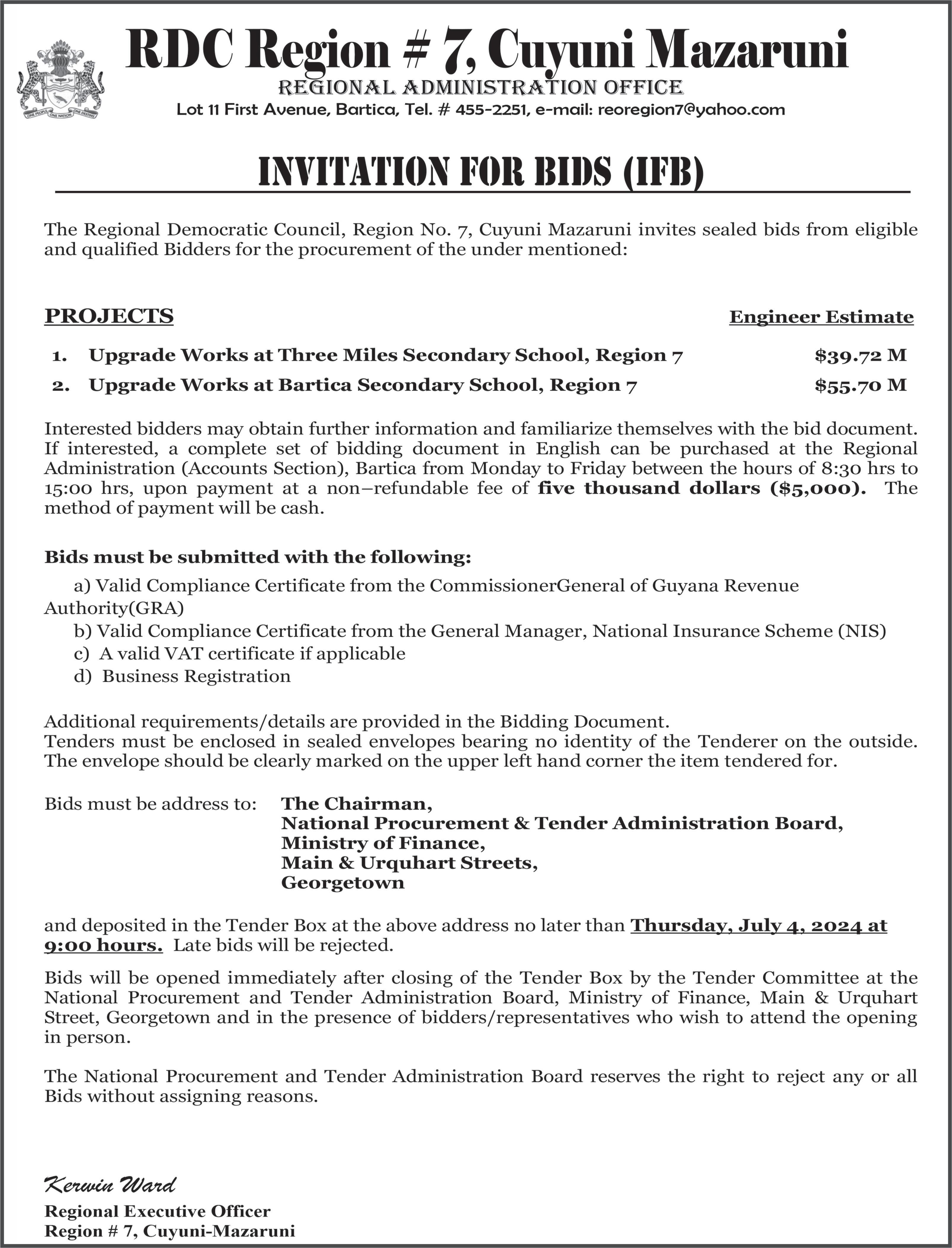




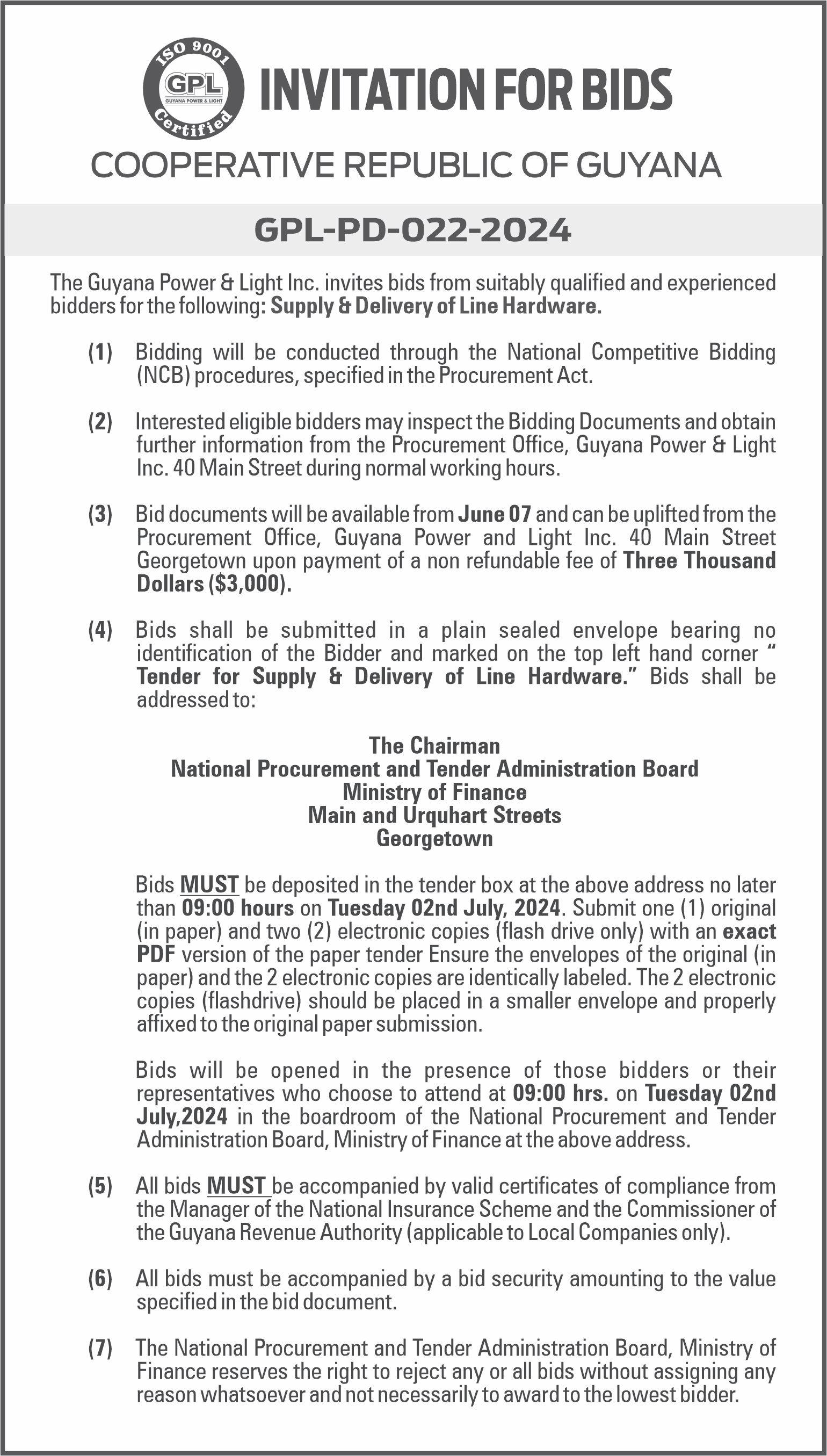




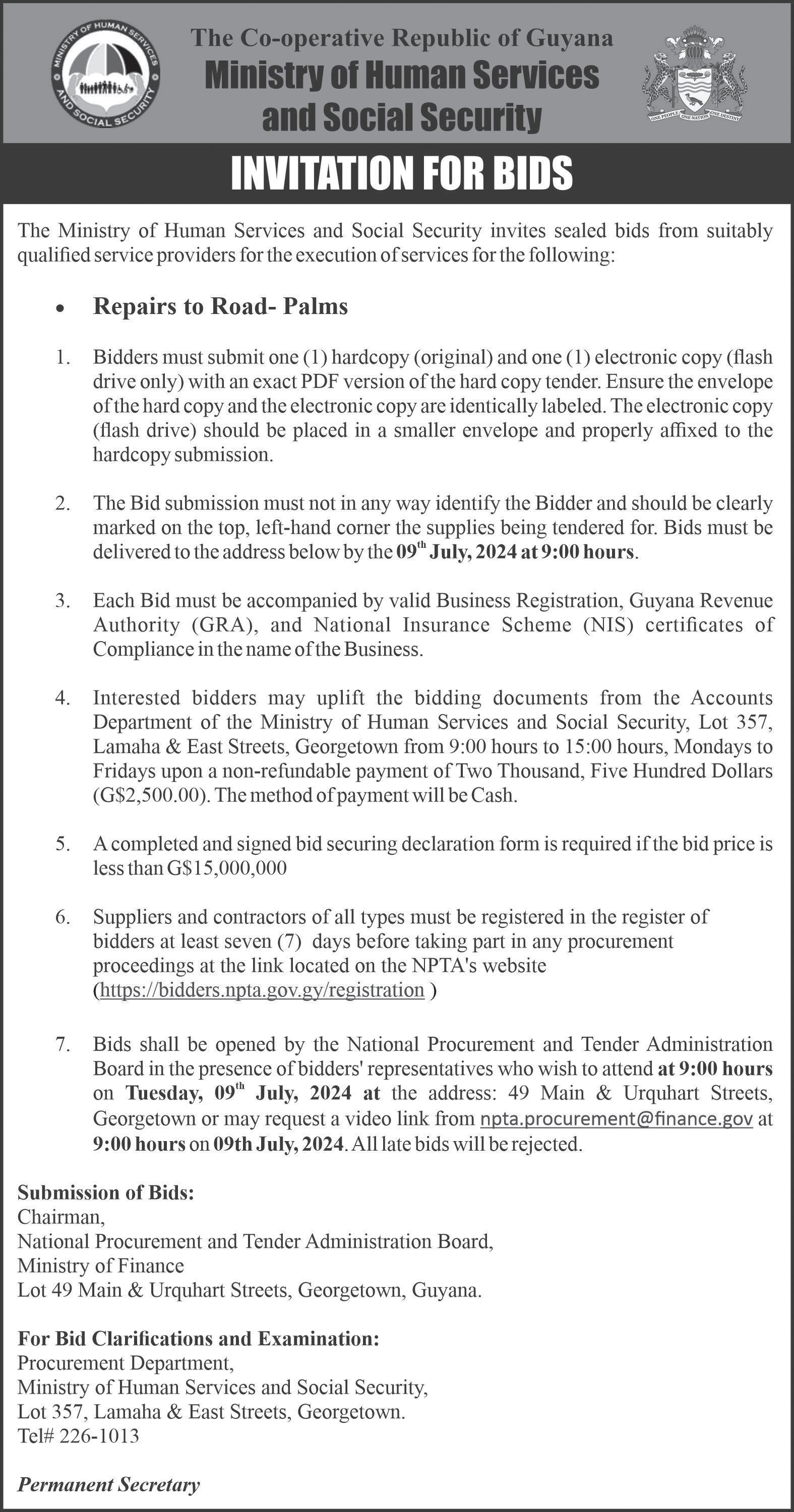

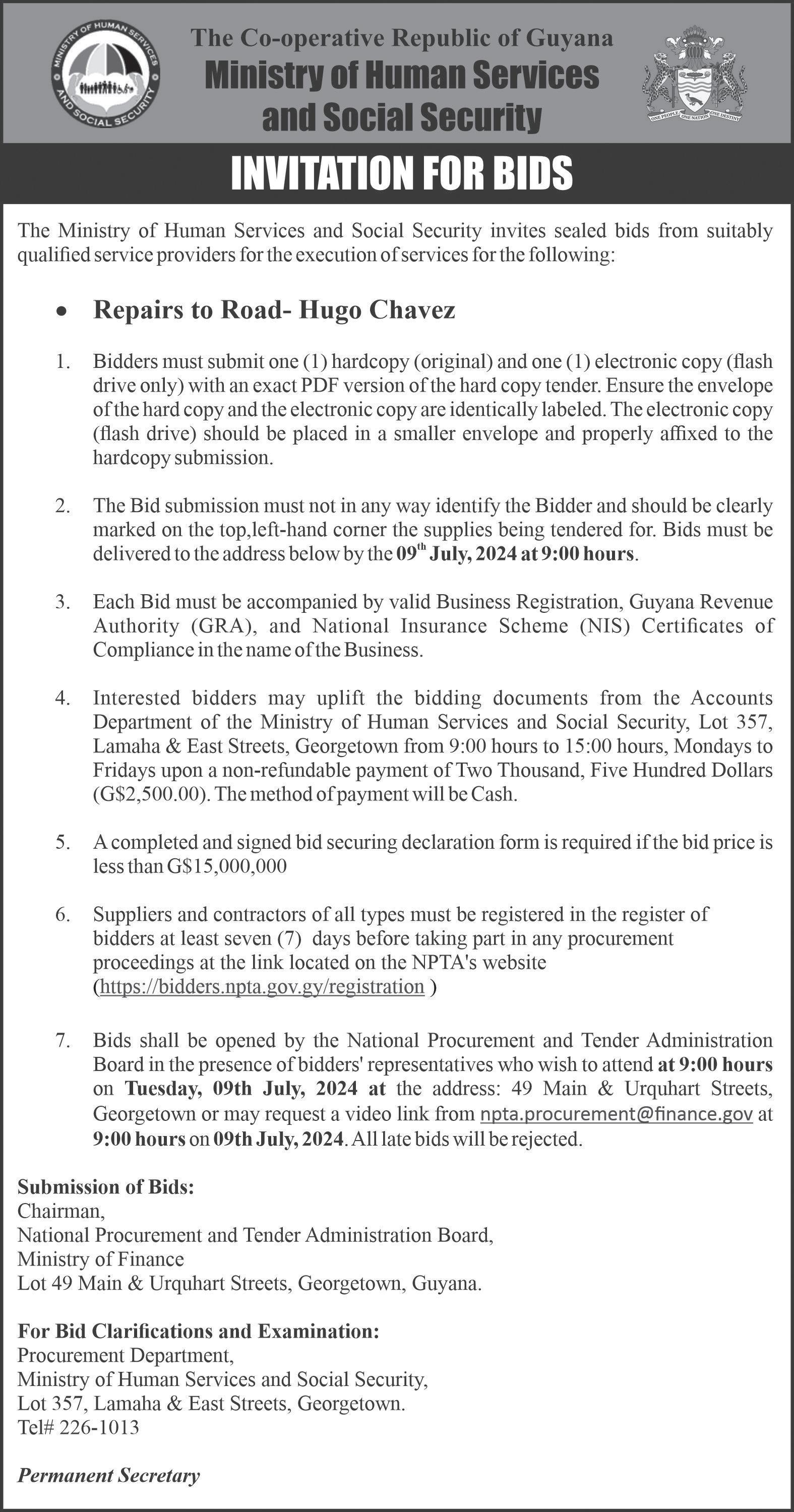



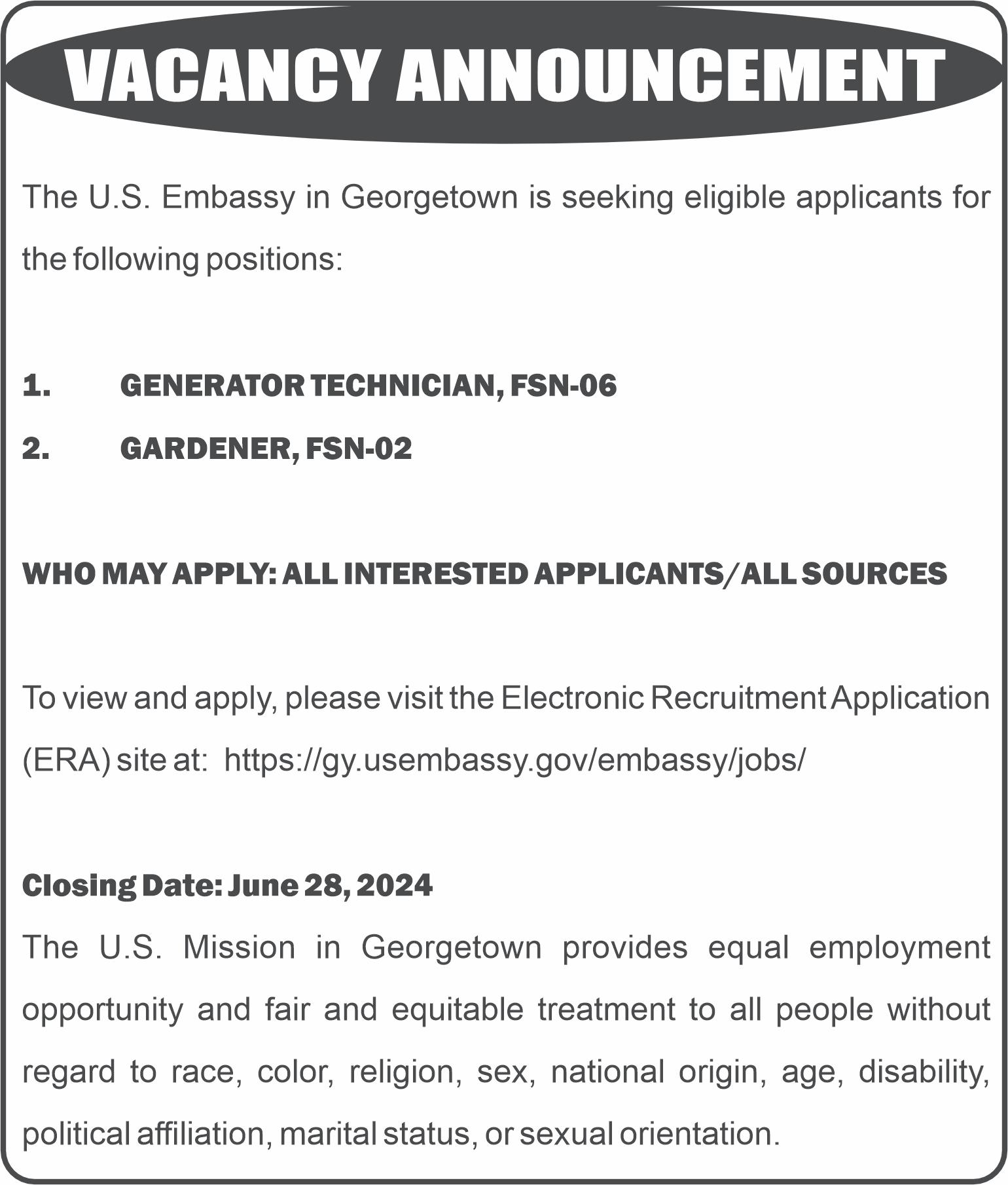



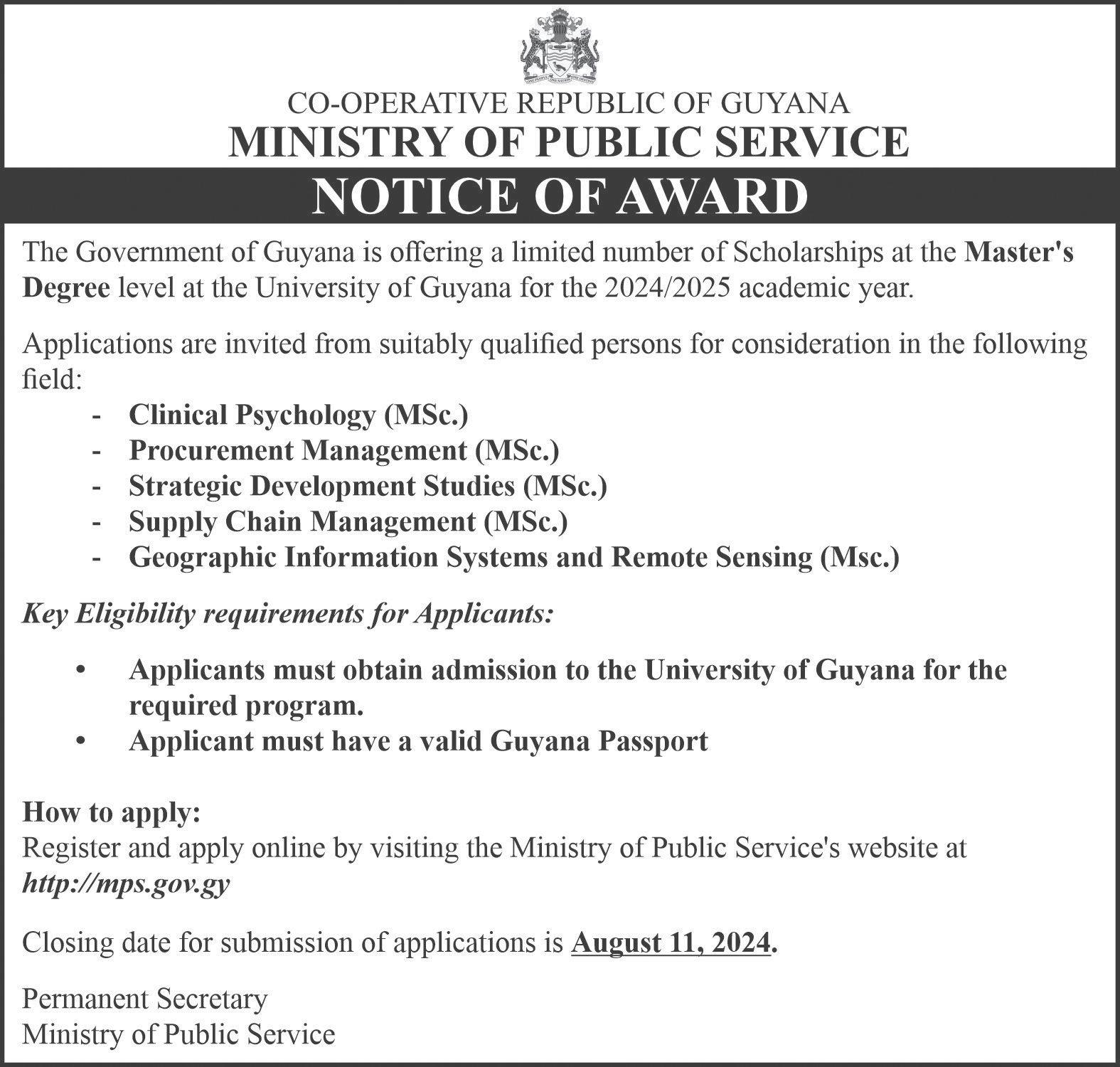




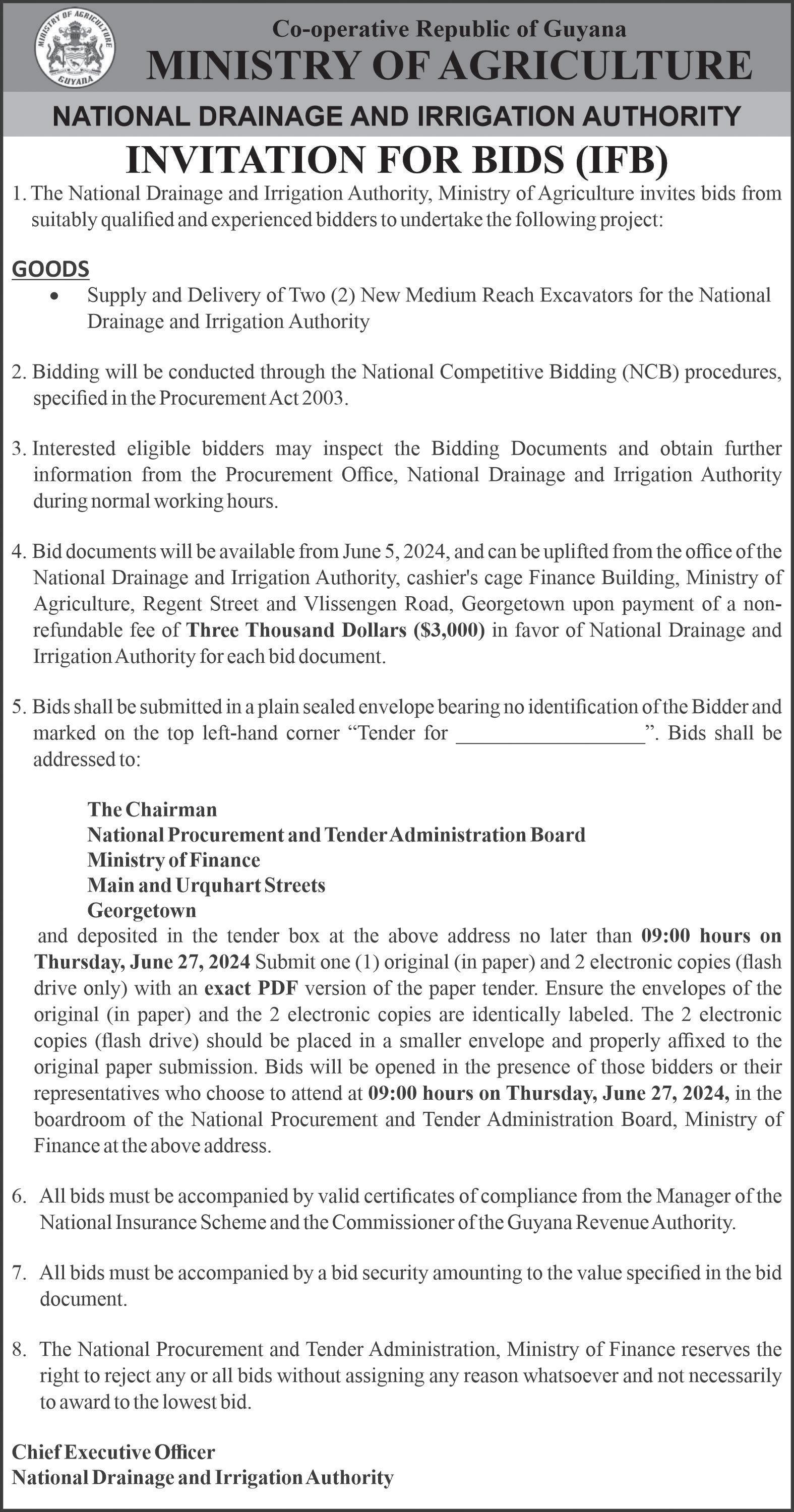

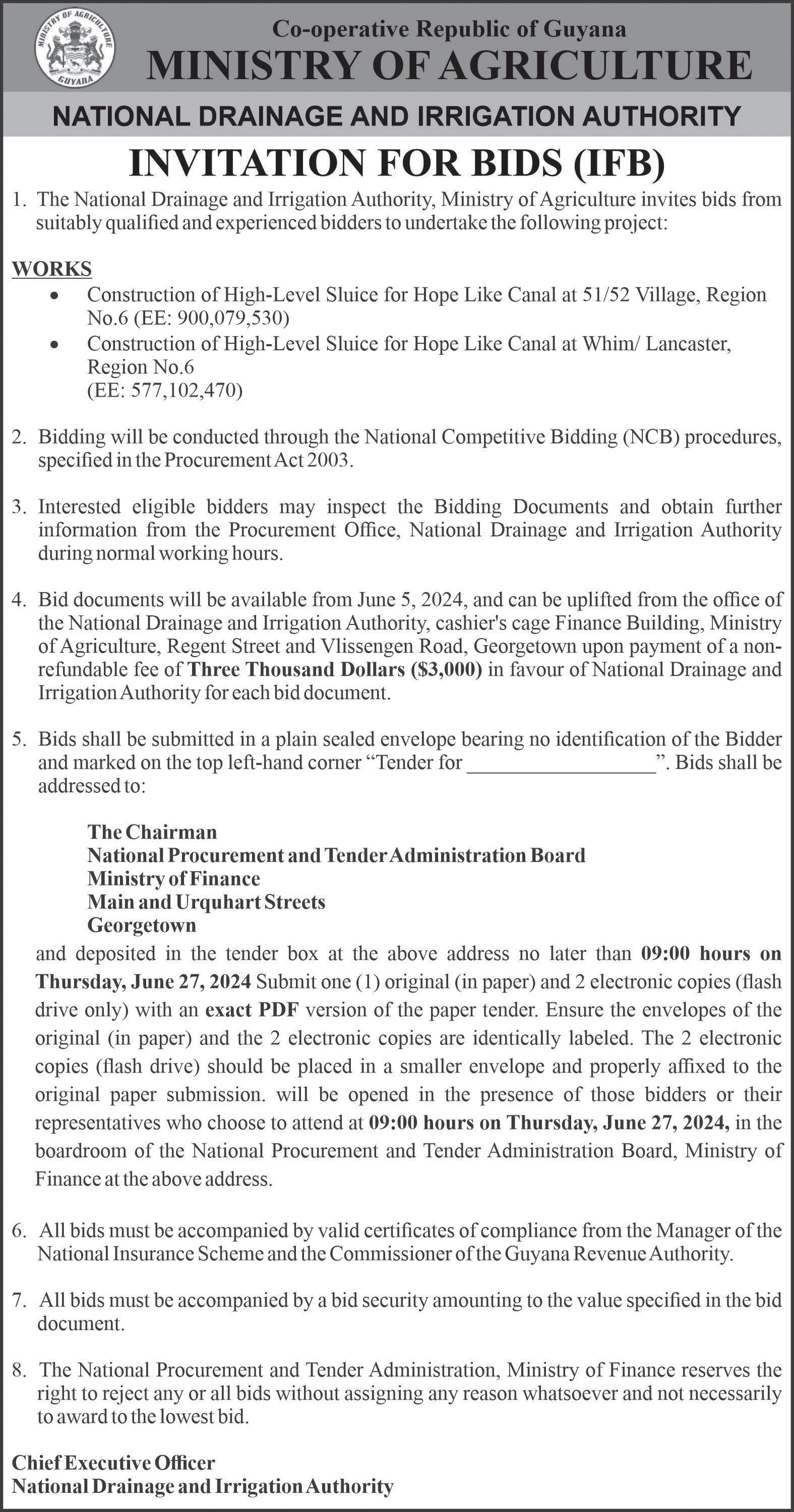

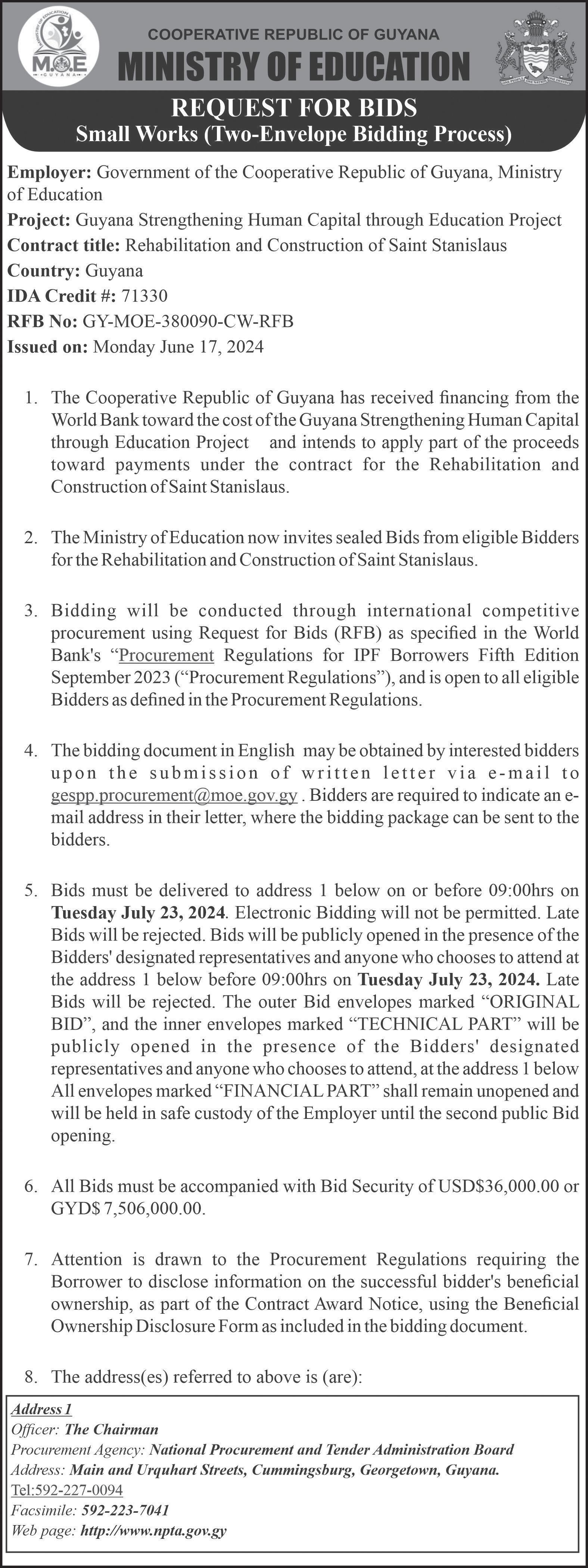





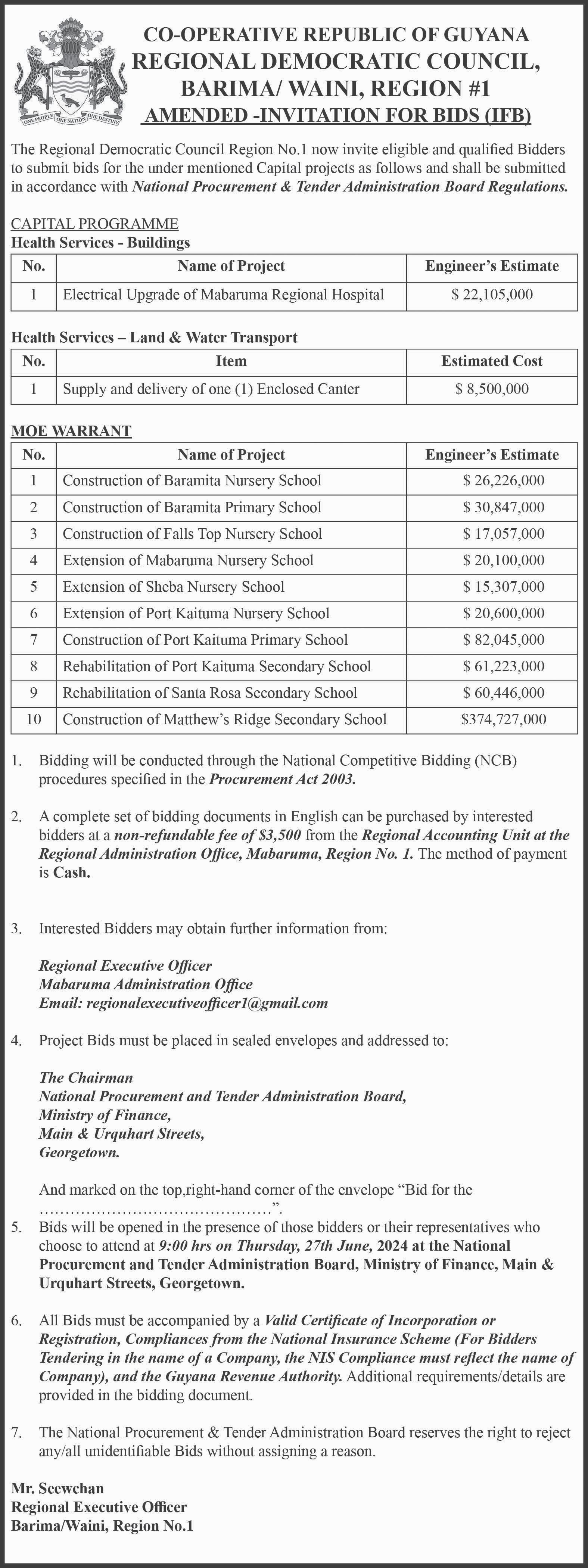









Most voices may be committed very genteelly: a man may debauch his friend’s wife genteelly: he may cheat at cards genteelly.
JAMES BOSWELL (1608-1661)
Life of Johnson, 6 April, 1775
Dear Student,
Welcome dear friend. One way for you to recognise the main information of the text is to practise matching articles with their headlines. Yes, your ability to identify the main idea of the text will help you choose the proper headline for that article. Note also that your

understanding of the main point of an article includes considering the text totally after you have read it and summed up its most important information. Be wise.
Love you.
GRAMMAR
Improving sentences structures
A. Placing adverb clauses
Reminder: Like adverb and prepositional phrases, adverb clauses can be placed in different positions in sentences. Look at the two sentence patterns below. For example:
(a) As soon as lunch is over, you can go to the museum.
(b) You can go to the museum as soon as lunch is over.
Notice that a comma comes after the adverb clause when it is used to begin a sentence.
Notice that a comma is not used when the adverb clause comes at the end of a sentence.
Something to Do
Write two sentences that follow each of the patterns below. The first one is done for you as a guide.
1. When ________________, ______________.
When it rains, we stay inside and bake our favourite cake.
When I finish my morning chores, I’ll have a bath for school.
2. ________________ before _______________.
3. __________________ as if _______________.
4. Although ______________, _______________.
5. ________________ unless _______________.
B. Choosing Appropriate subordinating conjunctions
Reminder: When you use an adverb clause, be sure that you choose the subordinating conjunction that best suits your meaning. For example, each of the following sentences has a different meaning.
1. We went on relaxing holidays after Mommy was in the hospital. (after)
2. We went on relaxing holidays while Mommy was in the hospital. (while) 3. We went on relaxing holidays although Mommy was in the hospital. (although) 4. We went on relaxing holidays because Mommy was in hospital. (because)
Something to Do
1. Using the most appropriate subordinating conjunction, combine the following pairs of related ideas to form complex sentences with adverb clauses. For example: We reached the hotel. The thunderstorm struck.
As we reached the hotel, the thunderstorm struck.
(a) He changed the locks. We watched him.
(b) I trimmed our neighbour’s hedges. I needed the money.
(c) They started up the mountain. Visibility was poor.
(d) We finished our banquet. We collected our garbage.
2. Follow the directions given for each of the following sentences.
(a) She drank the medication.
(Add an adverb clause to show she was optimistic about its effect.)
(b) We arrived.
(Add an adverb clause to show when we arrived, and another to show where we arrived.)
(c) The cow raced through the field.
(Add an adverb clause to tell why the cow was racing through the field.)
IMPROVING READING Summarising
Read the selection. Then, answer the question.
Analysing a political cartoon
Political cartoons that often appear in print media present a particular point of view. Political cartoonists not only express an opinion, but also try to influence the reader’s view on an issue. Using exaggeration and humour, cartoonists make powerful statements.
Most political cartoons use symbols instead of words. A symbol is a concrete object that represents something else. In analysing a political cartoon, look at all the images and words. They are the keys to understanding the cartoonist’s point of view.
Which of the following could be left out of a summary?
A Political cartoons present a particular point of view.
B They often appear in newsprint.
C Most political cartoons use symbols.
D A symbol represents something else.

WHEN amalgam was first introduced in the United States in 1833, many dentists were outraged at the suggestion of installing such a highly toxic metal in their patients’ mouths. In Germany, amalgam was called “Quicksilver” and anyone who placed amalgams was called a “Quack”. In fact, this was the origin of the word “quack.”
This controversy, later termed the First Amalgam War, was quelled when mercury proponents insisted that it was safe because it was stabilised in the hardened amalgam compound of silver, copper, tin and zinc and did not come out. Since amalgam was less expensive and easier to work with than the standard gold fillings, it was not long before silver amalgam was routinely used for filling cavities.
Controversy over amalgam use surfaced again in 1926 and into the 1930s when a German physician, Dr Alfred Stock, showed that mercury escaped from fillings in the form of a dangerous vapour that could cause significant medical damage. During this Second Amalgam War, the American Dental Association vigorously defended silver amalgam, and its widespread use continued.
The Food and Drug Administration has separately approved mercury and alloy powder for dental use, but amalgam mixtures have been approved as dental devices. Consequently, by using amalgam, dentists are using a nonFDA-approved device.

The Third Amalgam War began heating up in 1986. Pressure from mounting clinical evidence forced the ADA to finally publicly concede that mercury vapour moves from the amalgam filling into the patient’s mouth. But the ADA remained adamant that mercury in patients’ mouths is safe, and in 1986, it changed its code of ethics, making it unethical for a dentist to keep the consumer informed of a potential serious health risk or to recommend a procedure that could possibly improve his emotional and physical health.
For years, the American Dental Association has insisted that the silver amalgam used for filling cavities is safe. And despite studies showing toxic mercury vapour readings in the mouths of patients with silver amalgam fillings, the American Dental Association still maintains that mercury fillings are safe.
On December 16, 1990, the famous CBS television programme “60 Minutes” dealt thoroughly with silver amalgam fillings. The general message was that it was unsafe.
With effect from October 1998, all over-the-counter products containing mercury sold in the United States had to be removed from the shelves because the manufacturers could not prove their safety.
Notwithstanding, there has not been sufficient evidence to suggest that the use of silver amalgam should be discontinued. My professional advice is to be aware of it. Despite the fervent persuasion of critics of this filling material, it remains common in some quarters of the world. In fact, silver amalgam fillings in the poorest countries are as popular as ever mainly because they are cheap, durable, and easy to use.

